 6Likes 6Likes
 |
|

6 Jan 2014
|
|
Registered Users
HUBB regular
|
|
Join Date: Aug 2008
Location: on the road
Posts: 99
|
|
|
Bolivia Part 4 - I
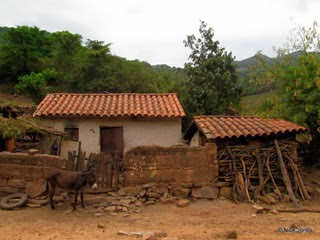
Heading to Padilla, a house along the way.
In Part 4 of Bolivia: After the testing Devils' Road (from Part 3), I take it easy in laid-back Samaipata, go in search of Ernesto "Ché" Guevara during Holy Week, and then visit Amboró National Park first from the mountainous south and then across the rising rivers of the north as the rainy season begins. *As usual I write far too much about far too little....
-------------------------------------------------------------------
eBook Files:
Kindle File (mobi)
ePub File
-------------------------------------------------------------------
Or just read it at the website! http://blog.talesfromthesaddle.com/2...ia-part-4.html
I'm walking now, in a town called Padilla.* The streets are broad and dusty.* An iron fence surrounds the large tree-shaded plaza and there’s a man leaning against it.* He turns his face towards me as I stand deciding where to go and I notice his leather hat.* It has a broad peak and is the colour of red mud. The colour matches his own skin.* In the shadow cast by the hat, I see his two eyes glowing white as light and a warm friendly grin shines out as well.* It’s the only smile I receive here in Padilla though as the other men, sitting in plastic chairs lining the avenues, are drunk and drinking….and staring.* I don’t like the stares, even knowing they are purely drunk inquisition, and I feel a little uncomfortable.* The women appear tired.* Tired of the men perhaps and they pay me little attention as they walk with heads that hang like so much weight, feet dragging in the dust.* And so, as the men drink and the women amble, it is the children who are left to manage the shops; selling wine,  and cigarettes to the inebriated men.* So strange, to allow so many days of so much sin for the whole of Holy Week.** Thanks be to God.* And to Jesus who died for our sins.* Would it not be better if we died for our own?
My footsteps echo as I walk down the narrow passage hemmed-in between white walls.* It leads to the town’s market and inside, tucked into one corner, a solitary woman at work making neat pyramids out of purple, red and orange.* There are sacks of green and the smell of earth; that metallic tinge of freshly pulled potatoes, and on the floor lies a baby, kicking its legs on a colourful cloth.* The woman smiles and the baby too, making three smiles in Padilla.* Despite struggles with baby, the woman counts apples and tomatoes into a bag for me and then goes back to busily preparing her vegetables, expecting an imminent rush.* Then, as I walk further, back on the pale avenues now and looking for bread, the stares are glares like many hands, kneading me small.

Another man hunts for the feast in Villa SerranoVilla Serrano, a short ride away along smooth red dirt is in complete contrast with Padilla.* The exception though is that still everyone is drunk.* Thankfully however, they are smiling and quickly I lose count of just how many smiles I receive.* Even before I've stepped from the bike an excited man hurries to tell of a huge feast to which I must go for a belt-tearing lunch.* I'm beyond hungry, it’s late and the afternoon hot.* I sweat and sweat as I walk and walk in search of the fiesta, expecting and hoping to stumble upon the great and noisy feast.* I look out for open doors and listen for the familiar tinkling of cutlery on china, or for people returning home holding taught bellies, sighing and grinning with over-fed satisfaction.* But, I find none.
Exasperated and hungry I return to a shop beside the main square.* There’s a metal gate in the doorway and I whistle into the dark interior.* Feet shuffle, and from the wood and shadows comes a friendly woman who brings me a coke and the last of some old looking empanadas.* I take these to the park together with some green mangoes bought from a nearby truck-full.* Famished and parched I bite into the empanadas, the old cheese cracks between my teeth like plastic.* Children come over giggling nervously to practise English as I struggle to quickly swallow the dry pastry in my mouth, “My name is Angelique.* What. is. your. name?”* With my mouth still half full I reply, “My. name. is. Nick.* Nice. to. meet. you!”* Angelique looks at her friend, let’s out a shrill and they run off giggling all the way across the plaza.* Tired from a long morning’s ride and as such content, I sit there enjoying the time, the place, the mood, to just be and watch.* Then a boy trips and falls on his face and cries and cries, the moment is broken and I return to the bike.
“You have been to see Che! [Guevara]” asks a man as I reach the bike.*
”No, I’I'm going there now!* I've just come from Padilla.”
”Ah, okay….so you go this way?”* he says pointing up the hill.
”Hm, actually I don’t know, is it that way?”
The whole family begin describing the route in great detail, each one confusing me with little titbits of information,
“There’s that tree….” says the first.
”And that big hill….” says the second.
”And then the bridge.”* says the third.
”but you don’t want to take the right…” says one of them.
”oh, no!” says another.
”The right?”
”You know if you go right mi amor, it brings you out on the opposite side of the river,”
”no that’s the turning after the house….”
”no that’s the left before the bridge, I’m talking about the right AFTER the bridge?”
”What bridge?”
And so on until perplexed.
But soon, with their legs buckling under laden stomachs they succumb to sitting on a bench with sighs of relief, the directions stop, legs outstretch.* I tuck the last of the hard empenadas into the top-box and as we talk it’s not very long before the family are inviting me over to their house to eat their Easter leftovers, “I made too much,” says the mother, “we’ll never eat it!”* I contemplate squeezing in a second lunch but also the very preposterous notion of rejecting a good meal.* I hang my head and admit that, no, sorry, I’m simply too full to eat any more and I have to decline!* Before I have contemplated this too long they turn the conversation to ask more about my travels.
“So where do you wash?”
”Rivers usually, pools, the sea….” [not a boast, I’m just tight]
”Que hombre!” (not true)
“No, well, actually it’s a bit tricky here [in Bolivia], the altiplano is so dry and cold, not many rivers!”
”So, when did you last wash…”
”Hmmm….about one week ago, outside of Tarija, a very nice river!”* With really big tadpoles I remember.
”You can take a shower at our place if you like?”* the daughter says.* I think about my feet, they are awful, smelly.
”Nooo…really, thanks, it’s okay.* They’ll be rivers ahead, it’s no problem…I don’t like to be any trouble.”
”Ah don’t worry it’s okay!”
”Well,” says the son-in-law, “you’ll be able to wash in the Rio Grande ahead!”
We laugh, because it's obvious that I won’t of course.* We continue to talk for a long time, though I can’t concentrate on what is being said.* Instead I find myself wondering why it is that I have turned down all these fine offers.* But I know why.* And my smelly feet are just one reason.*
Leaving Villa Serrano I kick myself for turning down the one thing I’d have hoped for on Easter; Sunday lunch with a friendly family.* I pass by the mango man at his truck on my way out of town with a nod, and as I continue along open roads I begin to analyse things past. *What was the problem, why did I turn down a free lunch? *I can’t leave a problem unsolved, there has to be an answer. *It leads me to wonder why do I do what I do, and why do people do what they do.* I treat people (and myself) like a problem to be solved, trying to work them out, to find the answer, and once I have the answer I’ll be on to the next one.* Or else I can’t solve it and will move on anyway, will leave it behind, fearing the problem, my problem, me.* Until I forget the people, the laughs, the beauty, moments of connection until all I can remember is the problems.*
As I ride, finding it hard to leave the questions behind, eventually the way has me concentrating and enjoying.* The road stops, disappearing into a muddy river which only barely slides by.* There are two tire ruts cut deeply into dark wet sand leading into it .* It’s a small river but it looks very soft and I fear getting helplessly stuck in the deeper sand in the middle, but I’ve little choice.* Across I go, wincing, fearing the saturated sand, but this time Rodney manages to pull through.* I puff my cheeks with relief as I exit and continue along, up and into airy pine forests.* I love pine forests, love the cool air, the soft warm floor of orange needles, the enchanted feeling, the husssssh of the wind through the trees.* I think about camping here until I see the route ahead, zig-zagging down into a triangular valley and boxed in at both ends.* Perhaps just a bit more then!* Soon though and I remember back to the Pilcomayo canyon where it was so hot in the valley floor, up to 55°C!* Whilst not wanting to hit the higher heat 2000m lower, I remember that I have no water for camp and no fuel until distant Samaipata meaning I’ve little option now but to continue onwards, downwards.*
Reaching the Rio Grande and there certainly isn’t an opportunity to wash.* The river runs black and angry amongst a mass of huge jagged boulders.* I can only imagine the carnage which the rain must bring.* Without my old Katadyn water-filter (broken, I’ve only a - crap -Steripen now) the water is undrinkable and I’m forced to back-track a short way to a few shacks. I park up outside the fencing and whistle out towards the buildings and a solitary pair of bare feet which I see pointing skywards at the end of a bunk-bed.* The guard comes out, chats, takes my bottles and – glad for something to do - fills them up from his own supply which he probably filters and boils himself.* He has the unenviable job of watching over some mango crops and works 30 days on and 30 off.* No books, papers, TV or friends, just mangoes.* And the odd (as in occasional) gringo.
Down down goes the road and looking back it’s hard to spot the way I’ve descended, just sheer green walls on all sides, I’m surrounded.* The steep road provides no opportunities to camp and the few houses I find are deserted with no one to ask; locked up for Easter.* Eventually I find a section of old road where a landslide has left a smooth lick of black lava-like dirt.* Having taken the trees with it, this landslide area also gives out to a fine uninterrupted view down the valley, all the way to the glittering Rio Grande snaking still farther below. A fine spot!
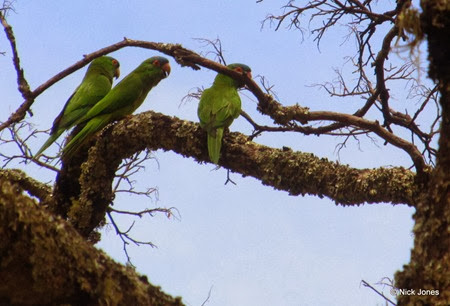
Parakeets, kwok kwok kwok! *Nice noisy comany
Around the far side, noisily singing amongst the remaining trees are parakeets.* I leave the half prepared tent to walk along a narrow uneven path amongst the debris of the landslide to get a closer look. I see swarms of the parakeets then, sweeping up and down, pausing occasionally and filling the trees with flecks of luminous green and red.* I inspect how much foot traffic might still be using this section of road – in case I should expect company - not much, and none recent.* As I finish preparing the tent I see, passing above me on the mountain ridge, the slumped shoulders of an arriero and the bobbing neck of his tired mule and I wave.* The sun sets, grey and purple and I stand admiring the view, excellent.* Then I kick myself for not accepting the Easter lunch.* Stupid.* Utter silence then, no traffic, and for tonight the valley is mine, o mine.
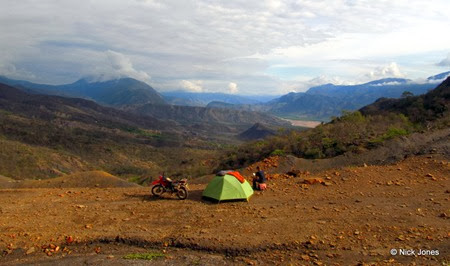
Camp, Rio Grande in the distance
By morning the parakeets have gone and the cool mist brushes over me as it reaches out from the valley towards the rising sun.* I sit and read and read and by the time I finally jump into the motorcycle’s saddle it is scorching hot in the late morning sun.* I'm alone on the road and ride slowly downwards into the valley, content, looking out from the road to the Palo Blanco trees with their small yellow buds like buttercups popping out on their pale, leafless and papery branches.* As the ride progresses and I near my destination, La Higuera, I start to wonder about the route, and the man behind it, it’s called “La Ruta de Che”.* I know little about Che Guevara and I wonder how many people really know much about him, save for the image on a T-shirt and the fact that he rode around South America on a motorcycle.** I was hoping to find out more.*
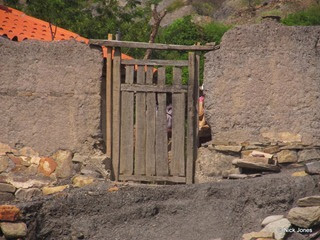
Some homes along the way, looked nice now, must be dire in the rainy season
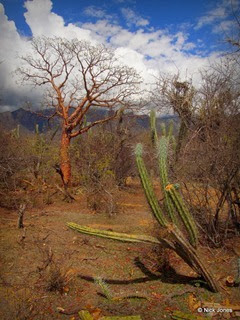
Palo blanco tree in the background

Bridge over the narrow break over the Rio Grande I reach La Higuera and talk with three men who are thick as stumps.* They’re drunk as Holy Week continues but they’re very friendly despite the obvious tourist trade visiting this tiny village.* They sit on worn wooden chairs, painted light blue, and lean back against adobe walls thinking “here’s another one.”** On the floor are slim glass bottles of liquor and on top of the heavy brown walls lie the familiar green plastic bags of coca leaves for chewing.* Together with the leaves is also a crumbly silver powder that acts as a catalyst for the coca chemicals, perhaps ash of quinoa.** I don’t ask for a picture, though I want one of this popular habit.* Instead, shy, I move off to a museum which is set up in a small bland adobe building.* The museum, not much bigger than my tent, is probably a bit crap.* But then at only 90p ($1.50) I’m going in anyway.
**
Inside, it is a long and thin room, like a big coffin.* There are some photos, a military green jump suit, like Che’s though not his and a calendar of events in Che’s life.* One wall* is almost completely covered with contemporary notes thanking Che for his example, his commitment, his inspiration, and his sacrifice to “the cause” or “freedom”.
“They were caught here,” says the curator pointing to a map of the valley, “they were spotted by a peasant when stealing his potatoes.”
”Ahh, right.” I say, not really sure about Che’s story, what has Bolivia got to do with him?
”They had very little to eat. The peasant told the military that the guerrilla were here and the army came and cornered them in the valley. Then he was brought here.”
I carry on reading.
“That’s where Che was shot.” says the woman.
”What, here!?” I ask dumbstruck.
”Yes, he was sitting here and asked to go here.* He was shot nine times, by the Bolivian Army, in the legs and throat.”
”Nine times!”
It seems hard to believe, not that it’s unbelievable, but instead simply incredible that here, right here, is where Che was shot.
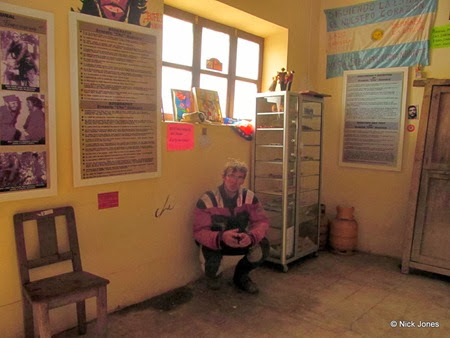
Ché was shot right here“They [the CIA and Bolivian Army] wanted it to look like he was killed in action,” continues the curator, “after he was shot, they took his body to Valle Grande,” a town nearby.* I don’t understand some of what she says then, but gather something about his hands being cut off and his body being thrown in the woods.
The photos depict a man almost completely unlike Che, certainly of little resemblance to the guy on the T-shirts, save the hard dark eyes.* I’d have to read and find out more about him I thought, and over the coming evenings and mornings whilst sat at camp I did just that.
The full story of Ché’s life is long and quite extraordinary, despite its relative brevity.* His Cuban nickname was Ché – coming from the Argentine tendency of using the word Che like the British say “mate”.* His actual name was Ernesto Guevara.* Travelling South America Che’s eyes were opened to the exploitation of his continent by the north Americans.* With a growing interest in socialism/Marxism/Communism, Che ended up in Guatemala for the sole purpose of bearing witness to the country’s revolution.* It was there in Guatemala that Che’s opinions of the north were solidified, as he saw the CIA-backed (in conjunction with United Fruit Co) guerilla forces overthrow the socialist president Arbenz (who was at the time carrying out land reforms to hand land owned by UFC back to the Guatemalan people, hence the name you may have heard, The Banana Wars and probably also, Banana Republic).* Later Che fled to Mexico city, where he first met with Fidel Castro.* It was the beginning of Che’s rise to fame, both with the public and the CIA.* Together with Fidel, Che trained, planned and - despite his non-Cuban status - became an important part of the guerilla force planning to invade Cuba to over-throw the dictatorial government.* On 2nd December, 1956, Che and Fidel together with just 85 others landed on Cuba’s beaches as a guerilla force. After three days march, Fidel’s forces were attacked by President Batista’s – CIA assisted - Governmental Army. (Later the CIA’s funding was ceased when they realised that actually Batista was a murderous dictator (hence Castro’s invasion)).* Of the 87, only 22 (or twelve depending on sources) survived the initial skirmish. The rest of course is history; these 22 (or 12) somehow successfully destroyed Batista’s army, over-threw the government and by January 8th 1959, both Fidel and Che had arrived in Cuba’s capital, Havana.
Some time later and with Ché hoping to spread communism further, he left in search of the next revolution; the DRC (then Zaire) in Africa. Ché however, eventually gave up his fight here, thanks mainly to lazy, drunken Congolese colleagues.* He returned to Cuba and planned his next mission; to rid South America completely of “gringos”. His plan was to start in Bolivia, rather than his homeland of Argentina.** With Bolivia bordering five countries, he felt it would better facilitate the spreading of communism, on all sides. But unlike in Cuba, where the locals were quick to help, the Bolivian people seemed apathetic.* Unable to see further than the next meal or fiesta (perhaps) and hoping for a quick fix, the Bolivian people were easily bribed by – CIA assisted -governmental forces, paid into informing and double-crossing Ché at every step. It meant that Ché walked into one ambush after another.
As the situation worsened, running out of food, they turned to stealing and in one particular instance were spotted by a farmer as they stole his crop of potatoes.** The military soon arrived again, this time shooting Ché three times, catching once his rifle barrel, piercing his calf muscle and then – more to his chagrin - his famed beret. He was taken to the village school in La Higuera – now home of the museum where I am - and there the military awaited instructions.* The order soon came from the Bolivian president to kill Che, relayed by Felix Rodriguez (a CIA official at the scene), who instructed the Bolivian army to make it appear as if Che had been killed in action.* Asking for volunteers, a drunk militiaman named Teran stepped up to avenge his three dead peers.* The CIA official, Rodriguez stood outside, heard shots at 1:10pm and walked off to make notes.
Ché’s was shot nine times on October 9th, 1967, he was 39.* His body, first displayed in Valle Grande was later tossed, without his hands, somewhere into the woods.* The body wasn’t discovered until 30 years later, in 1997.* Exhumed, he was then taken not to his homeland Argentina, but Cuba, where he now rests (though probably not in peace, as it must pain him that some capitalist bastards are making a fortune from selling t-shirts made in China and worn by gringos!).* Other points worthy of note, Che was a phenomenal writer, a nasty murderer, about as far left-wing as Kim Jong-il and to top it all; he never actually rode a motorcycle around South America.
|

6 Jan 2014
|
|
Registered Users
HUBB regular
|
|
Join Date: Aug 2008
Location: on the road
Posts: 99
|
|
|
Bolivia Part 4 - II
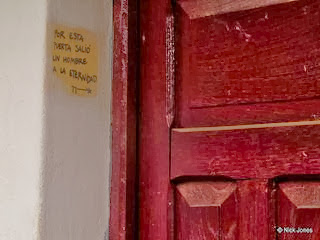 As I leave the museum I read in the doorway, “By this door left a man to eternity.”
Myself?* Well, I’m off to a place called Samaipata.* I take a route as advised by a Frenchman who I also met in La Higuera, he was a friendly guy but I got the impression that he more or less lives a life of lazy drugged debauchery, inviting travelling Che fans to sit, drink a  , smoke and eat munchies.* On the other side of the road his father runs the the only other hostal; the Telegrafista Hostal.* So the family have a nice monopoly on the tourist trade there.* Something else to please Che!* Que mierde!

Alberto Korda's famous picture that made a million shirts.The Frenchman’s recommended route is tricky to find, though this in part due to everyone that I ask for directions being a tad tipsy for Easter.** Up and down the road I go again and again, looking for the turning.* I stop as a man tosses a red snake into the road and watching it land with a flat splat I see that there are three other snakes in the road too, red and dead.* The man is slicing his way through the tall grass of his garden with a machete.* When I ask the way, he simply points with his chin to a younger man nearby, “ask him.”** Without so much as a second glance the man returns to his work, preoccupied I suppose with red snakes.* I’m told by the second man that I must turn off a little way back, at the school.* I saw no school but take him at his word and when I return again the school seems obvious and huge.* A road doubles back behind* the building and then, sweeping around gently, the red trail crosses the valley plain directly towards a sharp green ridge of mountains.* I hope to find camp away from the village somewhere in the mountains but when I get there I find that there is not a single opportunity to leave the road.* After crossing the mountain pass, I drop down the other side into a second winding and fertile valley and with still no chance of camp, I continue onwards, zigging and zagging tiresomely up a second towering mountain ridge.* Finally, a little exasperated and approaching the top beyond the tree line, I find a great spot and thankfully start to set up thinking of nothing but a thirst-quenching brew.
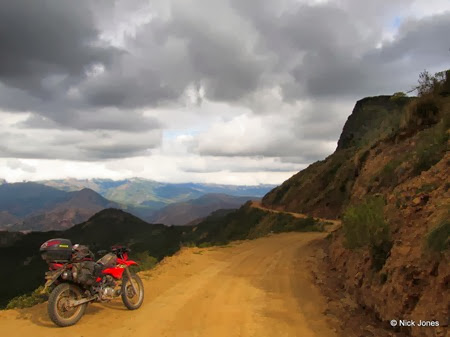
Continuing to Samaipata
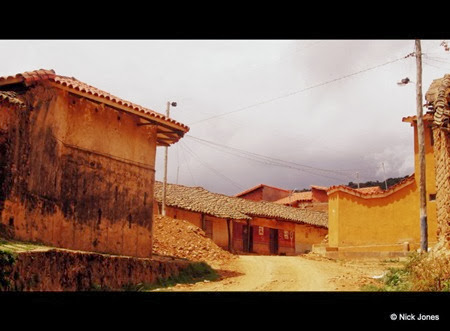
Entering Pucara, I think
Slap slap slap go their feet on the hard pack. Heavy feet filled with drunkenness, finishing work for the day and leaving the fields, talking loudly of the night ahead at the Easter fiestas.* Whilst the drunk men pass nearby on both sides, luckily they seem not to see me and once the sun sets I have a quiet night.* With the only noise being the sound of spoon on pot as I eat hot veggie soup, I look off to the distance, towards the first mountain ridge which stands out black against a moonlit sky.
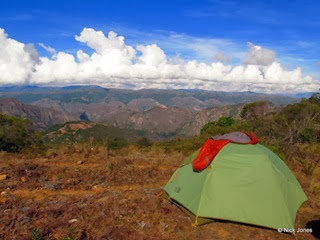
Camp, looking back over the day's ride and the distant ridge,
itself beyond many ridges and beneath the cloud!The cloud, warmed by the rising sun tumbles heavy and plump over the same distant mountain ridge in the morning.* By midday, I've ridden down from camp and into a third valley which I follow north to reach the main paved road to Samaipata.* As a Sunday, Samaipata is busy and it’s obviously a popular town for both foreign tourists and local weekenders from nearby Santa Cruz.* These people in trendy clothes come and go on quad and motocross bikes and fill the street tables of cafes surrounding the plaza and actually there seem to be few genuine locals.* I don’t eat out very often, mainly for budget, but today - perhaps to make up for my lack of Easter lunch - I decide to eat out!* As much as I yearn for one of the chunky burgers and chips on offer, I force myself to find something somewhat authentic and by luck I find a really great place.* Here the cooks are grandmothers and mothers, the waiters and waitresses are the children, and the owner is a mafia-don-like Godfather.* I get the very last of the day’s Easter special meals; a huge serving of chicken, rice and salad.* All this is served with a drink of mocochichi, a juice drink made with dried peaches, each glass with a big peach-pit.* Sat in a plastic patio chair, as is quite common, I sit contentedly eating, listening to the coming and going of people, and the happy party talk of the large Latin families.
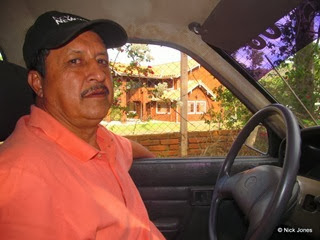
Juan, top man!The hills of Samaipata are a lush green of perfectly trimmed lawns dotted with exceptionally fine houses.* These houses are European in style, clean and neat, the archetypal chalet retreat in the forest, away from the city.* By Monday almost all of these houses – immense by Bolivian standards - are unoccupied, save a gardener who ambles about the large gardens and pools.* All that effort, a perfect house, and no one living there!* I stay in a hostal and the owner, a crazy teacher called Juan, gives me a tour of the town and -more so- its surrounding houses, “LOOK!" HERE’s ANOTHER $45,000!” he says in complete disbelief as if we've unexpectedly stepped upon a gold mine, then instantly, “LOOK, HERE’S ANOTHER!* $40,000!”* I don’t have $40,000 I think, but these houses are massive and I could easily make do with a much smaller place (for $4000)…and without a gardener.* Back to the hostal and it’s coffee time with Juan, his wife and the hostal’s housemaid (oddly I was the only guest).* Juan likes nothing better than smutty jokes and innuendo and whilst it’s obvious his jokes have been told a thousand times over, we all have a very good laugh together, Juan especially. *Juan decides that he wants to buy my bike, as for him - and all other Bolivians - genuine Japanese bikes are hard to find and expensive with the market instead being dominated by cheap Chinese copies.* I like Juan and right here I change my trip plans, promising him that once I reach Ushuaia I’ll ride back to Bolivia when he can buy the bike.
"But let me buy it now!" he says,
"I kind of need it, Juan!"
"Just take the plane!!" he retorts.
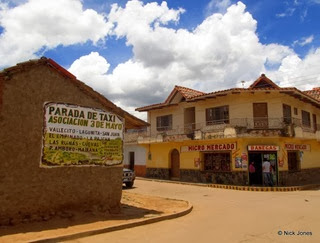
Hunting for lunch, SamaipataThe charm of Samaipata is its cool fresh tranquillity, away from the humid bustle and smoke of the city and yet not as chilly as the barren altiplano.* I find it hard to stop in one place any amount of time, worrying as I do about costs, even in economical Bolivia, but so friendly and comfortable is it at Juan’s that I decide to stick around a few days and catch up on laundry and bike maintenance.* Juan goes to work at the school early in the morning, looking comically serious in shirt and tie as I recall the jokes he was telling last night. As the only guest I'm left free to work in the hostal’s cosy tiled courtyard.* I chat with the maid as she launders sheets and clothes in one “pila” and I launder my own disastrous rags in another.* The large red parrot chirps in occasionally as we work and watch the “tele novellas” (Latin soaps) on an old black and white TV set.
My laundry finished and hanging next to the parrot under the eaves, rain starts to pour down making the tiles of the courtyard slippery.* Famished as always, I leave for the market, scampering down the streets as the rain fills potholes and gutters.* I see a dog poo wrapped in plastic as tight as a sausage skin; the dog had literally eaten a bag of litter, nutrients zero.* Into the market then, a dark and morbid place, all shade and shadows, but dry at least.* Past the first stalls selling crap, Chinese who-knows-what crap, past three children playing in the bloody black muck of the market floor.* Bowls of bowels on a chair, offal and hooves and cow hide and heads.* Out towards the far end of the market where there is fruit and veg, more open here, colour and light.*
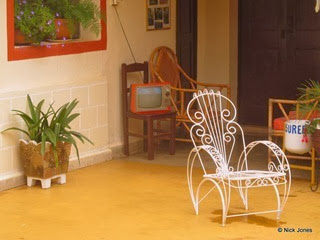
Courtyard of the lovely hostal“Why do you always buy from her!” hawk the other ladies, or tut as I buy my daily rations.* “Because she smiles!” I say over my shoulder with a grin.* And she does, seeming happy for my custom, my few pence, though she seems anxious too, I fear.** I see a dog rather happily trotting out, the plastic dog-poo dog perhaps. *The dog holds his chin high; to save snagging the long furry cow’s leg and hoof he carries in his mouth.* Bread I need then, the bakery I know is on the edge of town, difficult to find the shop once, harder still a second time.* I find it finally and sniff at the door, it seems cooler than usual and there’s a distinct lack of bready odour.* I whistle and the woman comes out smiling and slapping her hands clean on her apron, “mas tarde!” she says with a smile recognition.* I’ll go back later.
I hadn't needed the bread. Juan provides plenty with another round of sweet black coffee in his kitchen.* In between his laddish jokes I talk to him about my route ahead.* Whilst I haven’t made any plans from here, I’d noticed several tour companies offering trips to Amboró national park and I ask Juan about it.* Juan can’t tell me too much though, only that there are toucans and that the jaguars take a particular fancy to green tents and “gringitos como te!”* “Me!* But why?* There is no meat, I’m so skinny!”
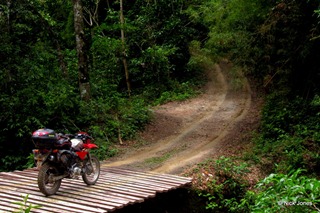
Heading to AmboróThe next day I ride away from Juan heading to Amboró, promising to see him again in March and sell him my bike.* Whilst it had crossed my mind some time ago, only now travelling on the wet and muddy road to the park do I realise that I've been travelling too slowly and the rainy season has begun.* I’d only expected to spend a month in comparatively small Bolivia but it’s been two months already and I'm certainly not ready to leave yet.* But it’s not just here I'm a little anxious about, but also Ushuaia, which I must reach before the winter, during which time I'm told the roads will be impassable.
Amboró has two sides, a lowland north and an elevated south entrance, separated by a less visited central area.* It’s possible to actually cross the whole park by foot over two weeks.* There is even talk of a road being cut straight through the park in the future to speed up exports from the lower jungle farther to the east, which currently have to travel to the distant Brazilian ports rather than cross the Andes by circuitous routes to the actually closer Peruvian ports. *This is actually a bone of content amongst Bolivians and Chileans, as Bolivia lost its seaports in a war against Chile. The pact was agreed similar to that of the Panama canal, a one hundred year lease, only the hundred years ended five years ago. Chile would lose two large cities, key ports, its border with Peru and a vast area of mineral rich altiplano. *(Don't take my word for any of this, this is just what I was told and has no citations).
I’m travelling to the southern entrance of Amboro which, as well as being closer to Samaipata, also contains the majority of the birdlife, in an area called “Los Volcanes.”** The trail is a variety of muds; hard-packed red clay, sandy dust or loamy soil and is either dry, saturated, or else a steep glassy sheen of solid clay that has just a sprinkling of water making it slippery as a toad.*
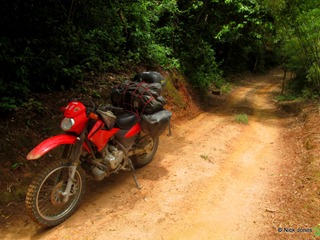
Burrowing through the jungle to AmboróAs I round a cliff top, several large parrots fly by in pairs, dipping amongst the trees and across my path.* I leave the bike to walk in hopes of a closer glimpse, camera ready.* They are turquoise, white and orange with black faces, and I call them “panda parrots” for I feel sure they have white ringed eyes, but now in memory that seems a bit absurd.* In any case, they are skittish and fly off always just out of view until finally, tired of my hunting they drop down into the immense valley.* Turning to watch their flight - and curse the buggers - I then notice the tombstone-like red “volcanes” rising up steeply from the valley floor and supporting the low rain clouds.
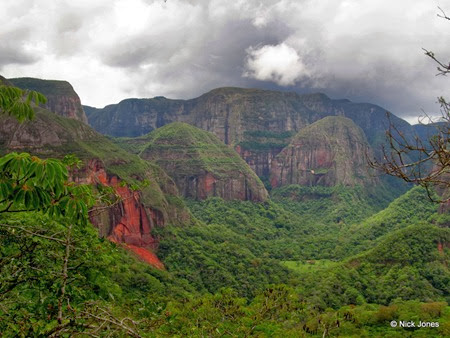
Los Volcanes
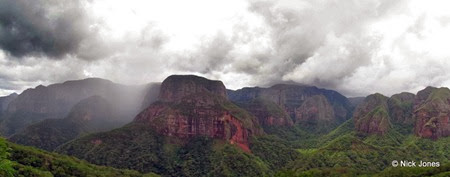
Los volcanes
Back on the bike and snaking along the top of the ridge, the road forks off left, angling down the steep sides. *It could be too steep for my bike to climb back up, especially in the wet and certainly if rain continues overnight and I worry about becoming stuck in the valley.* For now it’s fun, tunnelling through the dark green of the jungle on thick and loamy wet soil and mud and bridges.* I pop out then into bright light and a large neatly trimmed lawn surrounding the national park lodge.* However, when I speak with the staff I find that camping is not permitted and the rooms are by reservation only.* I try to explain to the staff, that I need just a small square, perhaps 0.5% of their space for my tent.* Understandably they hold their ground.* They point and I follow their outstretched arms to behold; the high mountains down which I’ve just descended as unmoving as their unbending rules.* I sigh.* I get back on the bike as a small jeep pops out from the trees at the base of the mountain and crosses the grass to disgorge another group of brightly coloured smileless reservees.* Pricks every one. *Though perhaps I was just a bit envious.
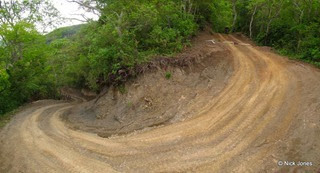
STEEP! *Dropping down to the refuge...hope it doesn't rain.
Spot the bike.In the saddle again, away from them, up the hill, a bit of clutch, lots of revs and actually the bike makes it up better than I’d anticipated, which is to say it made it up.* When I reach back to the fork in the road I turn left to continue onwards around the high ridge above the Volcanes valley on new ground, deeper into the park. This road doesn’t appear on my map, but I know that I’m heading roughly north east and I wonder if I might actually be able to cross the national park by some secret road, this road.* I pass one or two small farms as I rise and fall, skirting just beneath the peak of the spiney ridge until I come to a lofty and abandoned refuge.* The refuge resembles a research centre from Jurassic Park, torn apart by a T-rex!* It has a very commanding position, looking far, far out to the north across a vast plain of unspoilt jungle.* The road becomes very feint here and unsure where it goes I decide first to ride back to where I spotted two men working on a telephone mast and ask them about it.*
As well as the two workmen is a family that actually live in the concrete shelter which otherwise houses the electrics of the telemasts.* They tell me that this road goes nowhere and now I feel as if I’ve wasted a whole day going nowhere, here in the rain.* We continue to talk as a second engineer climbs down the mast and the father looks back to his family huddled apprehensively together in the doorway of the building.* We talk about the park, the birds and wildlife and the father assures me that there really are “loads of birds,” and just to prove his point he raises his chin and says “there’s a Great Big titted warbler” or some such.* “Where?” we all ask, as not one of us can see it. “There!” he says and the bird warbles again, calling out as if to say, “He-are-he-are!”
Unable then to cross the park by this road I have just one option remaining; to return.* Descending a steep pane of slippery smooth hardpack I decide to pull off before reaching the busier main road with its inherent difficulties for finding camp.* I leave the road by a thin foot trail through the jungle a short way across angled slopes to an opening and shut out off the engine.** It’s later than I’d thought and darkness falls as I set up and with it comes a crescendo of pleasant bird chatter and insect noise. *Amongst the noise is the very interesting throaty bark of the “wailing death bird,” which starts off as a blood curdling wail and finishes as a sleepy whistle, “WHAAAA.whaa, wha, whaf, pfoo, pfoooh ….WHAAAA.whaa, wha, whaf, pfoo, pfoooh!” An interesting one that never fails to make me smile despite my nagging fear that if it rains in the night getting down this steep trail tomorrow will probably involve me using the bike as a sled.
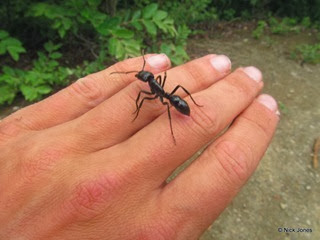
Ants come in one size: BIG
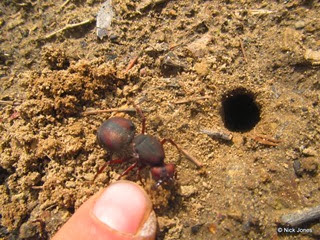
This fella was also big, and digging a hole
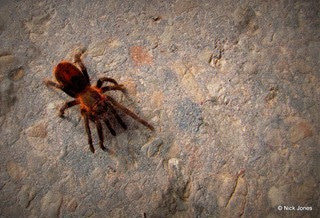
This chap was a little bit bigger than the ants!

Camp in the jungle, a bit tight, noisy and niceAnxiously I leave the tent in the morning, half expecting to find that it has been engulfed by gnarly green roots of the jungle, but it’s not, it’s even dry and Rodney is still there too, though he is going to take some extricating from amongst the trees. Not wanting to give up on Amboro, stubborn fellow, I decide to try and enter the park via its northern entrance.* This means a lengthy ride today, all the way around the national park via Santa Cruz to the village of Buena Vista on the park’s northern border.*
Fixing the camera, just an example of jungle noise:
Despite good paved roads which link Bolivia’s industrial capital Santa Cruz with outlying cities, it takes much longer than anticipated and it’s not until the end of the day that I arrive in Buena Vista, the jumping off point.* Wanting to be prepared for tomorrow I rush around the market to stock up and also to replace broken shoelaces.* The latter proves a little tricky as I only know the Spanish word for ropes, “cuerdas”. *I walk then looking for the national park’s information centre, passing a man sat at a roulette wheel on the pavement waiting for betters and farther up I find the entire populous of school children playing fuzzball at a set of tables actually filling the street.* The information centre for Amboro is contained within a small home and a helpful girl concedes that most visits from this side, like the south, are with organised 4x4 tours.* Also I can only enter the interior of the park with a guide, but this isn’t the biggest problem as - with this side of the park being more inhabited - I can use local guides.* The biggest problem is to actually get there. *With the rainy season getting underway, and having had several days of heavy rain the rivers have become impassable and even 4x4s normally carrying the organised groups have been forced to postpone visiting.* The silver lining however, is that on the bike I might be able to use a canoe to get across the worst and highest river.* Thereafter are several lesser rivers and I’ll have to cross those alone. “Oh, and normally,” the girl continues, “the last section you have to walk, buuuutttt, wait….you’re on a motorcycle, right?* Maybe you can make it!”** Maybe.
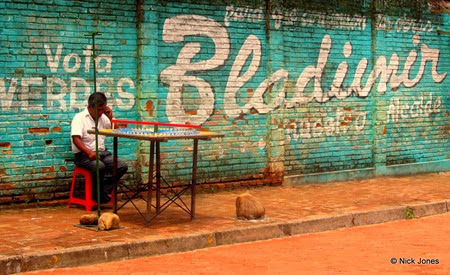
Not many takers at the roulette wheel
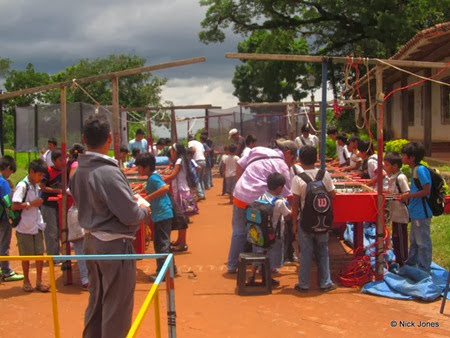
Because everyone is playing fuzzball!
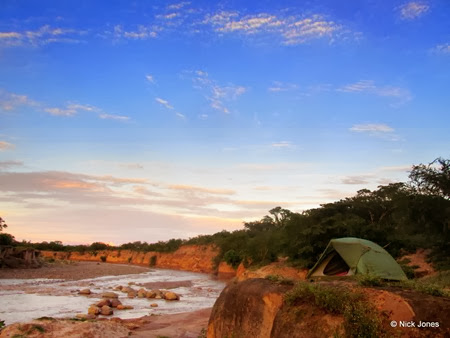
Riverside camp

A great moment when you see this view and KNOW
with all certainty that, "this is the spot[to camp]!"I ask the girl about a good spot to camp for tonight and she gives great advice which leads me far outside the village until I come to a point where the muddy road stops and disappears down into the huge twist of brown river, the Surutu.* A large patch of grass here provides a great spot for camp (#527 on map, the river must have moved/widened) and offers a high viewpoint over the river, which looks immense.* Whilst I don’t need to cross here I fear that I won't be able to farther upstream tomorrow.* A man arrives then in a taxi, the taxi stops, the man gets out, the taxi leaves, and I ask the man where he’s going, “over there.” he says gesturing to the far side of the river and picking up his bundle.
”What, you live over there?”
”Yeah.”
”But…how?* How do you get there?”
”Caminando,” he says.
And sure enough he walks across. *Maybe I can cross!
The night is thick black, like the first moments after turning out the lights and you can’t see a single thing.* This time however your eyes never adjust and you continue to be blind.* Despite its proximity I can’t see the river and can only barely hear it, as if the darkness -like a black hole- is swallowing all, reducing the noise to a muffled hush.* My tent is tucked up on a grassy corner between river, road and jungle and with dinner finished I sit in the darkness sipping tea, just observing the darkness which seems new and unique, trying to see or hear something.* The birds are quiet now, hiding away in the safety-net of silence amongst the trees for the night, but then I hear something; the unmistakable snarl of a cat.* A big cat I think, though I hadn’t heard a single twig break and I wonder if maybe I’m mistaken.* Then I hear the noise again, an angry hissing snarl, as if the cat has seen the tent, doesn’t understand it, doesn’t like it.* Without a moments thought I reach beside me and put my hand on my head-torch and quietly I get out of the tent. * I stand slowly and slip the torch over my head but leave it turned off.* It is dark, dark and somewhere, the river hushes by.* In my socks, I feel the soft prongs of grass and the cool wetness of the mud seeping into them.* I stop, the cat I know, was close.* I stare and squeeze my eyes to try and squeeze life into them, to see. *But I can't, I need light. *Slowly I reach up, up, up and put my hand around my head-torch.*
CLICK.
And there is light.
One of the worst things about camping in the dark, is how inconspicuous your light is.* Like sneezing in a library.* All of a sudden, everyone notices you and in these cases, knows where you are.* And yet I have little idea of where they are.
The river hushes by and as I stare I realise that what I’m expecting to see is two eyes, green or marble purple shining back at me.* What are you doing, this is silly, I think for the eyes see me, but I do not see the eyes.* But then why would I?* They are not here…at least I don’t see them. *But there was something, I know it and now I want to see it, if only to confirm that I was right.* And so, one foot follows the other into the jungle, crrrrunch, crrrrack and splodge through mud, leaves and twigs and somewhere the river hushes by.* I push branches out of the way as others brush against my bare legs and after barely a few steps I stop, poised…and think and think; no, I decide, if it IS a jaguar….go back, get back in the tent….I turn to look over my shoulder, and the light tunnels through the darkness, but there is no tent, where is the tent?”* Panic surges and I hurry back then splodgecrunchcrack, until with relief, there it is, I see it!* I get inside, quick-quick, zip the porch, zip the door, zip the sleeping bag and listen, and listen and listen and the river hushes by….Hussssh.
|

6 Jan 2014
|
|
Registered Users
HUBB regular
|
|
Join Date: Aug 2008
Location: on the road
Posts: 99
|
|
|
Bolivia Part 4 - III
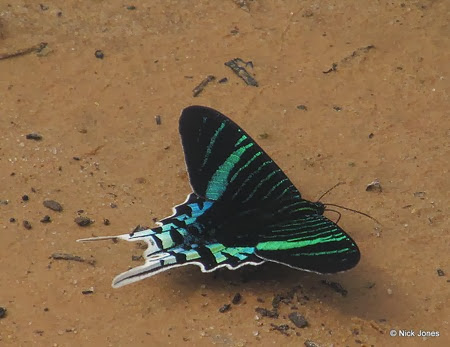
As butterflies go....pretty fancy.The birds bark and cackle, squeak and squawk in the morning and I stand staring into the jungle, staring at the noisiest of all of the trees, but not one bird can I spot, not one.* It’s always the same, a ragtime cocktail of tunes but I can never see the source.* Breakfast company is more visible; long leech-black millipedes and butterflies of orange, pastel green and a beautiful black dart-shaped one.* I
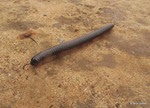
One, two, three, four...wait, stop
moving fella!ride back out along the lovely fast stretch of dips, ruts and whoops, back beneath the trees heavy with mangoes to Buena Vista.* From here along the main road to try and find the trail which leads to the park.* The morning is a hubbub of life and noise, buying and selling, motos, trucks, pickups and buses loading and unloading people and wares.* I’m so preoccupied by the sights and sounds that I miss the turn off and it’s only when I cross the river by huge expanse of bridge that I realise I’ve gone too far.* However, now on the far side of the river it crosses my mind that I should just drop off the road onto the dirt and ride to the park directly from here, surely avoiding having to cross the river! The locals must know better though, so I go back and find the turn-off.
A rocky bed scarred with a variety of tire-tracks darting off in many directions.* The bed is dry here and piles of wet sand and gravel mark the river’s recent high point.* Just beyond the drying detritus is the river, curling around like a thick brown question mark.* There are no other bikes nor a canoe, certainly no cars, but there are people crossing by foot, under burdensome loads.* I watch them carefully as they cross, using thick sticks to steady themselves against the muddy current, a little less than waist deep and all the while wondering to myself can I cross?* The thought disappears as I make the decision, let out the clutch, and the front wheel enters the water.* Whilst sandy at the edge I find as I progress that the middle and far side is littered with larger rocks and I buck and dip into hollows deeper than anticipated.* Uncontrollably I veer off left but just manage to catch the fall before gladly making it out.* As I ride up the riverbank, bags, boots and bike dripping dry, a group of locals chuckle amongst themselves at my recent bucking, seat of the pants, feet off the pegs, ride across.* They tell me that passing to left is the better way to take, shallower and smoother.* I’ll remember that for when I return. *Frustratingly, more locals arrive on motorcycles now, they would have shown me the way had I been a minute later.* Some men I notice prefer still to push their bikes, their Chinese machines perhaps more susceptible to the water.* I help one culprit with tools and labour to get his bike running though he is completely indifferent to my help and once fixed he sits there all the same, in no rush to continue.

I fixed this bike after he flooded it, the owner is in yellow and clearly in no rush to move.
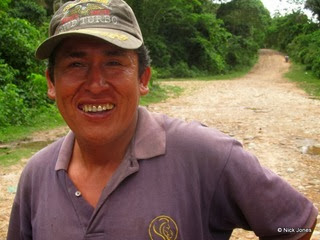
You should pass to the left, gringito!I leave the men behind to ride on towards Laguna Verde, passing a village with homes of broad wood planks and shaded by frond roofs.* There are no road-signs and the route is littered with rivers, many of which I cross twice as I take wrong turns.* There are two distinct types of river crossing; slow moving, muddy and soft, or otherwise fast boulder-strewn white waters.* The trail thins and thins as I progress until it is just two tyre marks in the tall grass.* I love the trail and love the place, until occasionally rounding a bend, the muddy trail drops steeply between the trees and all that I can see ahead is muddy water….and then more trees.* And then I don’t like it so much.* There’s something about it, just something I don’t like, the narrow field of view, the darkness, a tunnel through the jungle but no light at its end, just a river....Rivers, you just never know until you are safely across.* My fear is always of getting stuck half way, either flooding the engine with water or just bogging down in impossibly thick mud and not being able to push out alone. *Luckily today I make it each time and then pass a sign which tells me I have entered the national park.* This sign however doesn’t seem to deter the locals who – as it is well known - are still burning down swathes of jungle to make way for mandarins, beans and yams.* There are few houses now , far from Buena Vista and the trail becomes a footpath then which I ride along until it too peters out, outside the refuge.
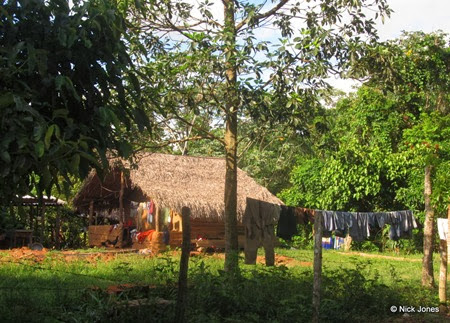
Idyllic
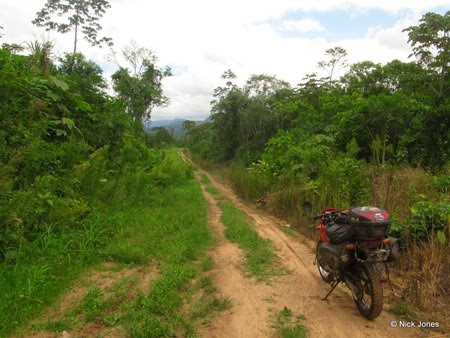
Lovely trail, not too long.
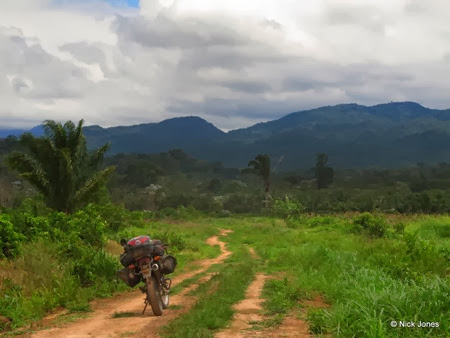
My guess is that Laguna Verde is in those mountains

Just don't like these...and there were quite a few.
The refuge for chickens.* A nice sign states that this is the start of the footpath to Laguna Verde, my target, but I can’t find the path.* I find a lot of chickens, and a lot of signs with tree names on them, and a very empty refuge (save for more chickens). *There is also a house at the end of a large flat pasture and I walk to it, but find it is deserted too.* Amboró is just not working out for me!
*
I’ve spent five days now just trying to get in to the park!* Sometimes you just know.* Sometimes you have that feeling that you have to try butthere is also something else in the back of your mind telling you - not so much that you will fail but - that you are just wasting your time.* Of course these amount to the same thing, failing and not arriving, but failing to my mind means that you gave up.* Sometimes though, it’s futile, you can’t do it no matter how hard you try.* And perhaps worse is that you know it…..and yet you still try anyway, then try again, and again.* I knew it, I knew it seven days ago sitting in Samaipata as the rain pelted down, before I'd even started.* Now there is little else I can try, save for walking randomly off in to the jungle.
I eat an apple and watch photon-beam birds, listen to their bright darting calls and start thinking about trying, luck, skill.*
Photon-beam bird:
I used to think that you could do anything and that if you tried, practised and worked extremely hard you could do it, you could do anything.* But it’s not quite like that.* One day you are dreaming about what you want to be when you grow up, watching these guys on TV whilst you do your homework, or reading about them in books whilst working your crappy part-time job, and then the next day you wake up and think “shit, I’m grown up” and the guys on TV are younger than you.* It’s not that I’m old, let’s get that straight, just that a lot of things require you to be kicking some amount of ass at an early age. *I’d spent so much time thinking about what I wanted to be that the opportunity -to be something a little bit special - had passed. *The world IS full of opportunities but if you (and likely your parents) don’t cotton on to one's God given opportunity from day one, then it will likely just pass you by.* Gone, boom. *So, to quote Joe Simpson,
“You gotta make decisions. You gotta keep making decisions, even if they're wrong decisions, you know. If you don't make decisions, you're stuffed.”
Quite right, and whilst Joe decided to try and get out of the huge crevasse he foudn himself in, I decided to get out of Amboro.
Just after setting off back towards Buena Vista I stop at a house not far from the refuge and talk to a man.* I wonder what opportunities he has had and missed, what was his gift?* He offers to guide me to Laguna Verde himself, but not today, it’s too late, he’ll take me tomorrow.* He knows the way well and –sadly for me - he’s no fool and won’t let this opportunity pass him by, must know what the tours are charging and therefore he wants a similar premium.* Well, I think, I’ve put so much time in, I can either keep going or quit Amboro, so I make another decision; to pay.
“Yeah OK,” I say, “can I camp here then?”
”Oh, no!”
”No?”
”No, if it rains tonight, you might not be able to get out across the rivers!”
”Mmmm, yeah, OK, well….if it does rain, how long does it take for the rivers to drop?”
”Maybe four months!”
And that was that for Amboró!

A cheeky meal
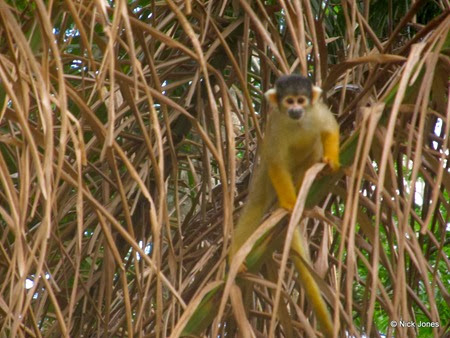
A cheeky monkey

Cheeky chappies
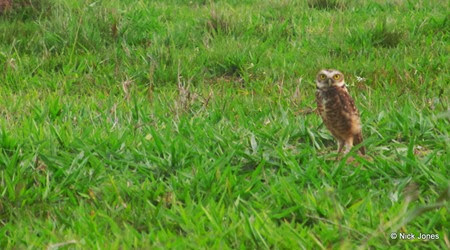
A cheeky....owl
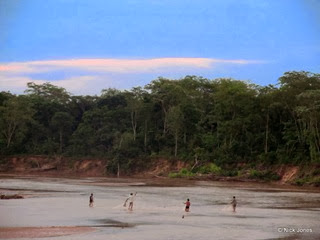
Fishing on the SurutuSo I carry on back to Buena Vista, riding the ten or so rivers a second time and return to my previous night’s camp hoping to see the jaguar!* Instead I see a group´of men turn up in a car.* It’s dusk, pink and purple and bang bang bang go the doors on the pick up.* I poke my head out of the tent and say hello.* They are uninterested and disappear down the red mud bank to the river.* When I look again, they are walking abreast each other, holding a net across the breadth of the river, trapping the fish as they walk upstream.* I notice that it’s not raining and I realise with some sadness that it won’t rain tonight after all.* The men return late in darkness and throw their machetes and fishing nets into their pickup, waking me from sleep.* Their torches dart over the tent and they chatter.* The sound of the  cans then, psst, psst, psst.* Four men with machetes drinking  outside my tent in a quiet corner of Bolivian jungle.* The nocturnal voice in my head says that they could rob everything I own, chop me up and throw me in with the fish, and not a soul would know.* I try to stay awake, to be ready, tell myself it's just evolution keeping me worried at night in order to stay alive, until I tire of the voice and succumb to sleep.*
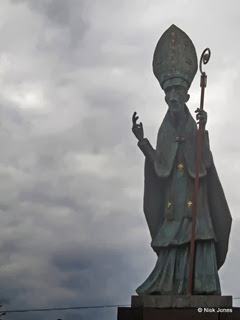
El papaI gasp and wake damp with sweat, I’ve slept a little late and the sun is high and burns hot on the tent.* Later, as I munch cold porridge and fruit, some local men arrive to gaze at the river.* They talk to me about “the men that came to fish,” and tell wild stories of how the fish were abundant, easy to catch, the biggest they’ve ever seen and “swimming so close to their feet that they could catch them with machetes!”*
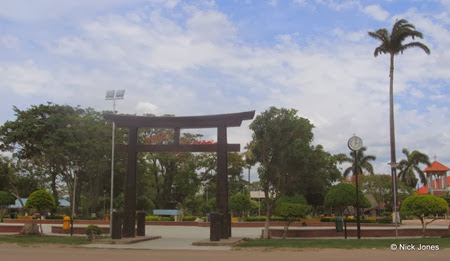
Okinawa squareEverything packed up, I look at the map to the loop of Jesuit Missionaries out east beyond Santa Cruz.* I’d been thinking about these a long time, before I’d entered Bolivia having seen them dotted on the map.* Ushuaia will wait.* I cut across from Buena Vista on a lesser road, avoiding Santa Cruz, and instead passing through a busy industrial-farming strip, including the Japanese colony of Okinawa. *As I progress the route become ominously quiet until the reason for this becomes clear: the Rio Grande.*
|

23 May 2014
|
|
Registered Users
HUBB regular
|
|
Join Date: Aug 2008
Location: on the road
Posts: 99
|
|
|
New Blog Post

NEW BLOG POST - The Mission, Bolivia Part 5
After Amboro, I head further east, deeper in to the Amazon, following the 1000 km Jesuit Missions circuit towards the Brazilian border.* Ravaged by mosquitoes and savaged by spiders, I continue to Laguna Concepción and an interesting ranch stay before travelling on through the Mennonite colonies to reach Santa Cruz.
The blog post is HERE
-------------------------------------------------------------------
eBook Files:
Kindle File (mobi)
ePub File
-------------------------------------------------------------------
I'll post it on here too if I can, but the forums give me a lot of grief with formatting problems, much better for viewers on the website... so better to click the link, there's also a new look website, too.
Enjoy 
|

25 May 2014
|
|
Registered Users
HUBB regular
|
|
Join Date: Aug 2008
Location: on the road
Posts: 99
|
|
|
The Mission - Bolivia, Part 5, P.I

After Amboro, I head further east, deeper in to the Amazon, following the 1000 km Jesuit Missions circuit towards the Brazilian border.* Ravaged by mosquitoes and savaged by spiders, I continue to Laguna Concepción and an interesting ranch stay before travelling on through the Mennonite colonies to reach Santa Cruz.
-------------------------------------------------------------------
eBook Files:
Kindle File (mobi)
ePub File
-------------------------------------------------------------------
The river doesn’t so much flow as sit, vast and heavy, like a flood.
The two boys jump in to the muddy waters and spit arcs of brown, smiling happily, shining in the sun.* They dive below the surface then, unseen, to untie and then drag a raft of shaggy planks out from among the many jumbled at the shore. *I hear the burble of an outboard motor approaching from across the river,* a raft nearing us with a silver pick-up truck filling it from bow to stern.* It rolls and yaws as the motor fights against the river’s invisible force.* Hidden among the gurgle of the motor is a noisy hubbub of the Latino workers.* They holler and shout, laugh and whistle, energetic and happy for the brief moment of work among the many hours of lethargy and wait spent besides the river.* I turn and see a motorbike speeding across the hard sandy floodplain towards us, feathers of dust rising in its wake.* The pilot is a huge man who dwarfs the bike, making it appear as if it were for a child. When the man steps from the toy-machine to turn toward me he appears square, like a shoebox with a penny for a head.
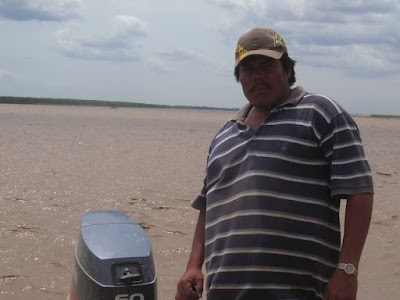 This rather Mexican-esque man took me across the Rio grande...Señor Shoebox
This rather Mexican-esque man took me across the Rio grande...Señor Shoebox
The man is the boat pilot, the boss. *Without having to break his stride, the pilot walks from his bike to the raft and steps aboard just as the two boys nudge it against the shore.* I’m called to push the bike on, the boys clamber aboard and the pilot pulls the starter rope.
Sat on the bike, I plant my feet wide to steady myself and in doing so catch my boot on a long bent nail.* I know it is long because there it is, almost all of its six inches and looking around more closely I notice its bent brethren poking out here and there like wild mushrooms, all heads and elbows.* Some of the wood sits loose in the bottom of the creaking raft, as structurally useful as a paddle.
Foolishly I had pushed the bike in nose first so that now, as we approach the far side of the river, I realise that I’ll have to drag the bike out backwards. *The square man smiles at my revelation, shiny teeth lined with gold, he knew my mistake all along.* Worse is that the flat bank of entry is instead on the other side a steep slope of soft sand as high as a man.* The pilot lifts the motor, a dry throaty gurgle, and it clicks up in its cradle and is turned off.* He then begins to fettle his teeth with a toothpick held between plump finger and thumb.* He won’t be assisting with the bike then.* Luckily the boys and others on the far side do help, six all told, managing to find somewhere to place a hand on Rodney and heave him out and up the steep sand inch by inch.* Laughing and panting at the top of the bank, we all shake hands and wipe sweated brows, whilst Square Man walks calmly up to the bow, flicks the toothpick into the river and steps on to the sand with not a rivulet of sweat on his brow. *I'm almost certain I can smell the detergent from his shirt which looks clean and starchy crisp. *A silence falls now as he steps over from the boat, it’s time to pay.* There’s an odd sense of tension, the quiet, him waiting, the teenage staff watching like jackals and vultures, as if I may attempt to ride away without paying for “the goods”. The price is actually fair and there is tangible relief as money changes hands.* It is quickly split into decreasing cuts, the last of the helpers looking particularly forlorn at his own share. *I'm instructed by Square Man how to get off the plain and on to the road…..and my impression is I should do just that, pronto.
After the dirt here, the road joins the main branch north-east from Santa Cruz, paved.* There are Jesuit missions marked on the map by asterisks and these are linked by a long loop of red which later turns yellow.* And so my goal is simple, to run the loop.* I expect no difficulties but when I reach San Xavier and the first asterisks, I find that the locals know little about the missions, nothing in fact, nor even the word, mission.* Synonyms, cognates and pronunciations fail one by one as I try asking for; Jesuits, church, big church, big old church, and more besides, but there are no answers, just blank looks.* Eventually I find the mission, in the next town – I wasn't in San Xavier at all.* Now though, with the delay, it is late and San Xavier’s mission doors are sealed, thanks be to God.* However, the exterior of clean white paint, contrasting dark twirls of wood and regal gold artwork are more than enough for me.* Truly divine.
I speak with the locals, leaning in their doorways as they watch their children idle in the dust and grass.* I ask them about camping, “sometimes the tourists camp in the plaza,” they say, but their twisted faces suggests that perhaps it’s not wise, or not wanted. *In any case I don’t rate too highly my chances of finding a private bathroom spot in the morning.* The police offer less assistance and I return*to the bike thinking over the ride here, trying to remember any opportunities I may have missed or forgotten, even half chances.* But there were none, certainly no clear chances.* The only thing I do remember is a crossroads and the two side-roads leading off from it which might provide some feint opportunity, I’ll have to try those.
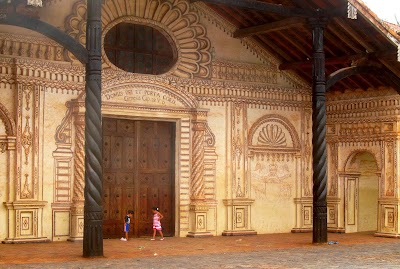 The first Jesuit mission built in 1749 in San Xavier, Very, very nice! When the Jesuits arrived, no one spoke Spanish, all tribal languages. Only Jesuits and locals could stay here, merchants were allowed 3 days. The Jesuits were kicked out in 1764 after Spain handed over some territories to Portugal, who believed the Jesuits were siding with protesting Guarani Indians and were also (European Jesuits) plotting to kill the President
The first Jesuit mission built in 1749 in San Xavier, Very, very nice! When the Jesuits arrived, no one spoke Spanish, all tribal languages. Only Jesuits and locals could stay here, merchants were allowed 3 days. The Jesuits were kicked out in 1764 after Spain handed over some territories to Portugal, who believed the Jesuits were siding with protesting Guarani Indians and were also (European Jesuits) plotting to kill the President
A broad road of smooth dirt leads off on either side of the crossroad.* Too smooth.* It must be busy, well used, populated.* I look at each in turn, left and right, left or right?* Sometimes just deciding where you want go is hardest, getting there is easy and the goal always so simple.* Left or right?* Looking for some clue, some sign…some reassurance.* The wrong choice here could make for a bad night, or at least a long one.* There’s little in it though, so I go left.
The trail is lined by fences on both sides and beyond them fields of green crops and pasture. *I pass many locals on motorcycles who have curious looks as they head into town after a hard day’s work.* It’s clear I won’t be able to camp here, at least initially as it’s impossible to leave the road.* If it continues in this way I will have to turn back and attempt the opposite trail, though I don’t imagine that will be much different.* Instead I continue onwards, hoping that road will change in my favour until I’ve gone so far as to have no chance of returning to the other trail in daylight.** Without any option I push on still farther, dusk falling, until suddenly things change, miraculously the fences stop, the land is wooded and open.* I daren’t question why and without hesitation I turn sharply from the road up a step almost as tall as the wheel itself but no match for my desperation to get off the road to camp.* My feet are bucked from the foot-pegs as I summit the step, I waiver and almost tumble before recovering.* I dart and weave through tall grass and bushes, hushing and snagging on the panniers and my trousers.* I pray no one is passing on the road, watching at my back as I aim towards a small cluster of trees.* There, amongst the branches I hear the invitations of parrots squawking “HERE! HERE!”* and as I bound toward them I'm sad to see them fly away.* I shut off the engine and at last remove my helmet to rub weary eyes .* A long way to camp, but in the end a fine spot.
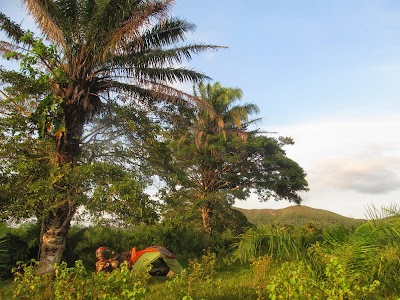 I had to travel very far to find this camp, all the same it was a lovely spot.
I had to travel very far to find this camp, all the same it was a lovely spot.
It’s warm and sunny, and I can sit out until late in the evening in just T-shirt and shorts, amongst tall dry grass, with birds in the trees and ants at my feet. *What a change from the cold barren Andes where I had to be wrapped up in the sleeping bag by 6:30pm or struggle to then warm it through.* It's not just the climate that is different, but also the people, their things and their places.* The towns I've found that whilst they are not huge urban areas, are long single boulevards of hectic bustling life.* There are tuk-tuks, taxis and moto-taxis, cars and trucks, bicycles and buses, and of course there are people, in hot grimy clothes on red muddy streets.* In contrast to the Andes the populous seems younger here too, or - more correctly -there are teenagers, where in the highlands there seemed to be few.* In fact, the majority of people here in the lowlands seem to be children and teenagers; going about in dentist/lab-coat like school uniforms, playing video games at Playstation rooms and facebooking in internet cafes, eating unhealthy snacks from street vendors, or else blitzing the streets on their 125cc Chinese motorbikes.* These bikes are stripped of all fairings, dials and lights for a cool, retro, naked bike look. *Continuing the cool they are usually ridden with helmet carried not on their head but in the crook of their arm, and usually with a giggling girlfriend on the pillion seat.* In the highlands there are few motorcycles, driven mainly by more mature men. * It seems common for the teenagers, once old enough, to move away to the main cities, often to study or else in search of modern life, work, or – I am told- in search of the glamour they have seen in the TV soap operas.
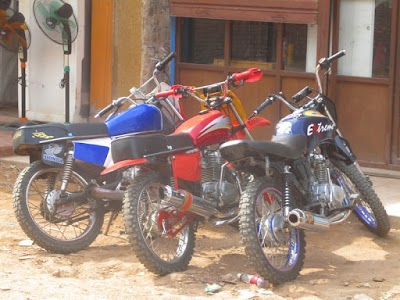 The locals like their bikes minimal, no lights, no electrics really, no speedo, no rear end save the seat, no stickers (SHOCK!) and a MASSIVE booming exhaust.
The locals like their bikes minimal, no lights, no electrics really, no speedo, no rear end save the seat, no stickers (SHOCK!) and a MASSIVE booming exhaust.
Whilst they won’t find glamour or glitz they will find a certain way of life in the lowlands that has to some degree, many of modern life’s “pleasures”; alcohol and bars, motels (brothels), fashion (in a sense), electronics (copies), food (deep fried), money (cash crops), motorbikes (Chinese), cars (“Ford Ran-Gurs") and no doubt some of the Soap Opera like drama that accompanies a town of drunk men, brothels and bargain-priced tarty clothes.* But I might be painting a false image here, it’s not all debauchery, alcohol and tarty teenagers.* These single avenues are full of a variety of temptation in other, more acceptable guises and in the avenue people bustle and barter, buying and selling at stalls, shops and on foot.* The key to selling in the Latin market is clear; make people aware of the product and put it within easy reach.* Maybe that’s every market but in Latin America this generally means putting the product in your face, under your nose or failing that just everywhere.* If a product is there and people are liable to pass by it, then most likely they won’t pass it by.* Even buses are susceptible with vendors using elevated platforms –* think upturned broom-handle with a shelf – which reach up to bus windows to put racks of crisps, chocolate, nuts and sodas tantalisingly within reach.* They can’t resist.* It is laughable.* And busyness breeds business, crowds swell curiosity. I could sell a piece of old rope, provided it was fried.* Honestly I could.
Historically these busy backwaters have all grown up thanks to the work of the Jesuits in the 1700s who first created them.* Originally this was to offer the - then nomadic – Amazonian tribes a fixed meeting point and to guide introduce them to Christianity. *These also served to link up other Jesuit missions as far afield as Brazil and Paraguay (then of course a wild Amazon, not like today) and of course as trading points.* It is perhaps this historical movement of people, of much passing traffic that has created these long towns which depend so heavily on the vast numbers of passing travellers rather than the core of actual residents.***The reality then is that now these towns have become busy bus and truck stops as people and goods make their way to and from Brazil, with the locals fighting for every customer.* It means that the centres of these towns – away from the main through-route - provide some of the quietest streets and some respite.* There the hectic bustle calms considerably and movement slows to a shoe-shuffling snail pace more in-keeping with the stifling heat.
In the centre are the missions, though originally these didn’t last long, thanks mainly to the changing hands and creating of new countries of independence in South America (i.e. the influx of Portuguese after the earlier Spanish) and by 1750 few actual Jesuits remained.* With the later rubber boom more Mestizos (a grotesque word that means people of mixed Spanish/Portuguese/Native Indian descent) arrived, outnumbering and eventually eradicating the natives.* Much later, from 1972 until 1999, a Swiss architect (and Jesuit) named Hans Roth worked at restoring the missions which had fallen into dilapidation.* Thanks to his efforts I am able to see them in their current and rejuvenated splendour on this long loop of road from Santa Cruz, north east all the way to the Brazilian border, south to San Jose de Chiquitos, and then back around to Santa Cruz city, almost 1000km.
The next morning I return to the mission in San Xavier, stopping first at the market to buy bread and fruit.* After the long ride in from camp, I’m already hungry and I chew terribly stale sweet breads as I make my way back to the mission.* Thankfully today the doors are open and I find the interior is airy and fresh – unlike the bread - and as with the exterior the mix of European and native building techniques and materials continues in a really fantastic blend.* The sun throws oblongs of light onto the square-tiled floor and the rows of plain dark pews and a shaft of light hits the golden alter.* Completely in contrast to the almost bland flooring and plain pews are the twisting pillars of pale wood spiralling up to the ceiling. * This ceiling rests on walls painted with golden cherubs strumming harps and floating over rather austere looking confession boxes.* I wonder what I would confess?* “I've not worked a day in over two years and I've left a trail of craps all over the globe!”
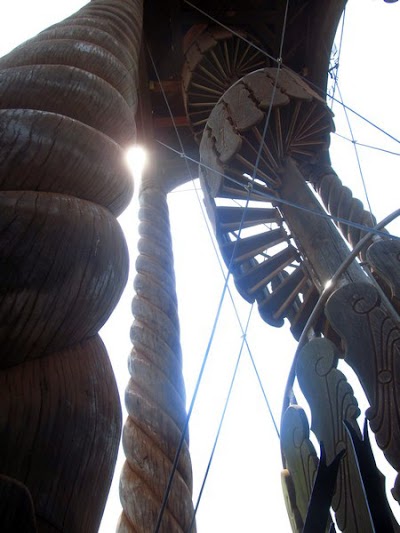
The steps to the bell tower.
In a room behind the alter, a door of rough wood leads me outside into the enclosed garden and courtyard.* At one end spiralling upwards towards heaven is the tall dark bell tower, its bells silent, hanging a bluish green with decay, religion entirely.* In fact the whole church is silent, not a single person at prayer, though I’m sure they must come, they should for the church is beautiful if nothing else.* I leave then, half empty and half full of nasty bread, eager to pursue the loop, to find more of these angelic buildings.
 Then heading further east towards the Brazilian border, on a long loop taking in 6 more missionaries
Then heading further east towards the Brazilian border, on a long loop taking in 6 more missionaries
The road is as straight as a spear, heading to the heart of the jungle and abruptly, seemingly at random, it turns to dirt bright red as from the termite mounds of Zambia.* Whilst straight the dirt at least gives me something to concentrate on where the asphalt was lacking.* There is hardly a break in the trees alongside the broad road and the few villages I pass are not hostile exactly but somehow unwelcoming.* Perhaps they are tired of Mission tourists or maybe it's just closer to the Brazil and the common no-man’s land feeling felt near borders, making me think again of Zambia and the border with Congo.** (All just perception though).
The road is very wide and rutted from the rainy season.* Small trucks making their way back west to Santa Cruz yaw slowly this way and that.* On the bike it’s fast and easy going but even so it’s a long time before I reach the second mission in Concepción.* Similar to the first but with artwork somehow less refined, more colourful but a little gaudy.
Before reaching a forth mission in San Ignacio I consider stopping to camp but the dense jungle means that there are few places to leave the road.* Several small rustic villages look interesting, quiet and might help provide me shelter.* I pass several not really sure at each if it is “the one”, or if I even want to stop and ask at all; it’s been such a long time since I asked to camp because I just haven’t needed to.* Then the next village hits a chord.* There is often that feeling, a place that I've never seen but feels like a vague memory, soft, blurry and missing detail, as if I've dreamt of it, or been there long ago.* It gives me a reassurance that my stopping here is preordained, that this is exactly where I'm meant to be, even going so far as to think that maybe I haven’t messed things up – generally speaking in life - after all.* I actually think all of this a little way beyond the village, standing beside the bike, part of me still not quite sure, trying to pluck up some courage, out of practise, but I tell myself, this is where I'm meant to be, I'm in the right place.
 In the right place, Pablo was more than quick to offer his space. Here he shows me his cheese press!
In the right place, Pablo was more than quick to offer his space. Here he shows me his cheese press!
I turn back and ride to the edge of the village which fronts on to the road and there’s Pablo, coming over, smiling like an old friend who’s been expecting me, like he’s had the same blurry future-memory as myself.* There is no doubt that I can camp, in fact it feels as if I needn't even ask.* Before I've spoken I find we are all of us sitting down together on plastic chairs outside on the yard as the cockerel pecks at the bare earth, the sun setting, drinking coffee and laughing.* Whilst we have the chairs, the girls of the family sit cross legged on the hard dirt floor in a triangle, plucking nits from the next, from the next, from the next, from each others smooth dark hair.* As the boys finish up playing football on the large patch of grass central to the village, I begin the magic show; setting up my tent beneath an arbour that would drip sap all night.* As always the tent poles bring the biggest smiles from the family as the segments unfold into a pole and then bend into incredible arches to help make a sheet a home.* Then the bed, blown up with a “pillow pump”, and finally the petrol stove lit with magic straight from my fingers (a flint), fuhGOGH!* And they jump as the spark catches and a quick lick of flame dances over the ground.* The stove flickers orange and splutters before settling into it’s steady blue roar.* I make coffee for myself and Pablo which brings a nice smile to his face.* I return to the tent then in darkness to cook and am followed by a small mob.* The tent porch fills with faces edging ever closer, old and young alike, mouths agape like children watching TV.
“What’s that?” asks the older girl,
“It’s….what, this?* It’s carrot…...do you want some?”
“Yes.”* No please, thanks or even hesitation.
I slice a piece and pass it to the girl.* I continue chopping the rest of the carrot and tossing it into the boiling stock as the girl nibbles experimentally at the edge of the carrot slice, and then smiles. *She’s never eaten carrot before.* Later I would hear her talking excitedly to her father, Pablo, and her mother about how she had just been eating carrot and peas and sweet potato, and I would notice particularly how she had to pronounce “zanahoria (carrot)” very carefully as if it was a foreign word and difficult to say.* There isn't just her of course, those others crammed inside the porch around the stove are also fed and I offer each some of the cooked dinner.* They tell me, quite seriously, it is the best thing they have ever eaten and ask how to cook it (boil some stock and throw in some chopped veggies, simmer for as long as your hunger will allow, eat).* I consume a small fraction of my dinner with the majority given away to eager hands and smiling faces. These smiles come at the cost of an empty stomach and later I secretly and selfishly eat my biscuits all to myself….
In the morning I wake from dreams of food, a stomach painful with emptiness and a pillow damp with dribble…as if I tried to eat it during the night.* I very sneakily eat a lot of cold porridge only to then be invited for coffee and bread together with Pablo and I feel guilty for being so selfish with my porridge, always so selfish.* We sit at a wooden table, rough like bark though worn smooth and made black over the years of meals.* Flies are abundant, a million clones look-look, buzz-buzz.* Pablo’s wife washes dishes as he talks of the tough day he has ahead, working in the fields.* I get the impression that actually Pablo will saunter over in his own sweet time and plod back some time later not having so much as dirtied his machete (I don’t mean this nastily, just Pablo was extremely laid back).
Pablo is called by his daughter from outside and he saunters out momentarily to milk her cow leaving me in the company of his wife and a squadron of flies happily licking away at the grimy table.* His wife becomes friendly, chatty and outgoing where moments earlier in Pablo’s presence she was diminutive and silent.* She sings along to the radio but complains about how she must always buy batteries for it.* I tell her she should sell it and buy one that works from the mains electric, an empty socket right next to the radio.* She says it is too expensive.* I wonder if I should buy her one, but the idea is quickly quashed by my golden rule, cultivated in Africa, to be careful not to act like a gringo (mzungu) charity.* I cover Pablo’s cup with his plate to protect it from the flies, but his bread remains easy pickings for them - though to be fair they seem quite content with the grimy table.* When Pablo returns he looks a bit bemused as to why his plate is on top of his cup and smiles to himself, “gringos!* aren’t they strange!”* When he goes to bite his bread and is joined by four flies also tucking in just at the end of his nose, he is unperturbed.
”Did you get much milk.” I ask.
”5 litres.”
”Hm, poco.”
”Do you have cows in England?” he asks.
”Yes.* Well, I don’t have any, but there are lots.* Only big farms now, each with maybe 200 cows.”
”200!* How much milk do they make?”
”I don’t know, maybe 20 litres each per day?”
”20 litres!”
”Yeah, maybe it is the climate, lots of rain so we have lots of good green grass!” then I say, gesturing to the roof, “we don’t have grass roofs though!”
”Ah, you have tin roofs….” he says, “it is better.”
”No, there’s not many with tin, people think it’s a bit ugly, we have slate (I actually say “stone” because I don’t know the word for slate). *Does the grass roof let the rain in?”
”No, no, it is very good, but after a while it rots and we have to change it.”
”How often?”
”Maybe once every two years…I want a tin roof but it is too expensive.”
”I don’t know, they make a lot of noise in the rain, you won’t sleep and the grass is free!”
We go outside and get some photos of the house, the camera is shown around the family whilst I look more interested in Pablo’s cheese press.* I take photos of it and I'm asked to take photos of the chicken, the dog.
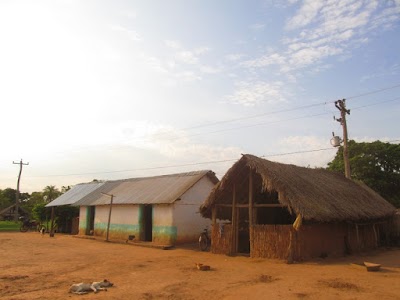 And this is house! He loved looking at my equipment, and drinking coffee....though he had a little less to tell me, though I tried really hard to find some questions....
And this is house! He loved looking at my equipment, and drinking coffee....though he had a little less to tell me, though I tried really hard to find some questions....
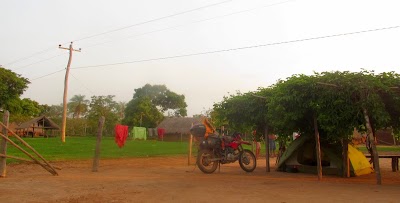
Beneath the arbour, a lovely peaceful village in the Amazon
Farewell I say and greedily, selfishly I store away some memories, a few paragraphs in this, my story.* And what have I left them?* Nothing.* And still I wonder if they’ll remember me.
White butterflies fill the air, like leaping hearts, jumping from the grasses at the verge of the road, hundreds, perhaps thousands of them for many kilometres.* A junction and a side road slicing north, a band of red mud between the vast green, heading to Noel Kempff National Park.* I’d wanted to visit there but had forgotten about it on grounds of time limit; my visa soon to run out.* Even so I'm tempted, but on top of the issue of time I'm also lacking fuel, money and a reservation, all of which mean that with a pang of regret I continue east.
|

25 May 2014
|
|
Registered Users
HUBB regular
|
|
Join Date: Aug 2008
Location: on the road
Posts: 99
|
|
|
The Mission - Bolivia, Part 5, P.II
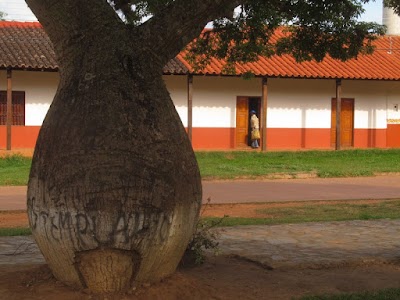
In San Xavier, I've seen a few of these bulbous trees!
 I want my house like this...
I want my house like this...
 Inside...here the altar
Inside...here the altar
 Some instruments of torture perhaps, "You WILL become Catholic, or else sweep my floor infidel!"
Some instruments of torture perhaps, "You WILL become Catholic, or else sweep my floor infidel!"
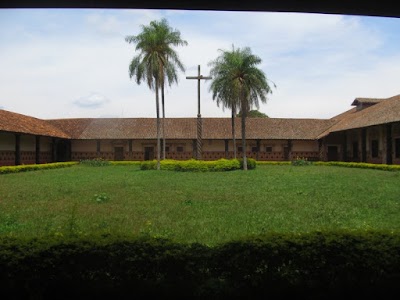 The gardens...
The gardens...
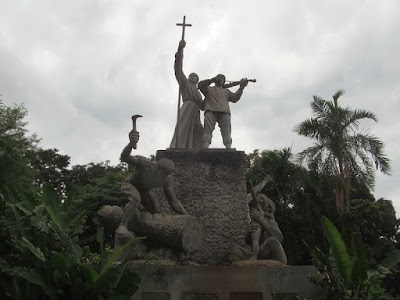
A statue in the plaza...music also played a large part
 And ANOTHER mission!
And ANOTHER mission!
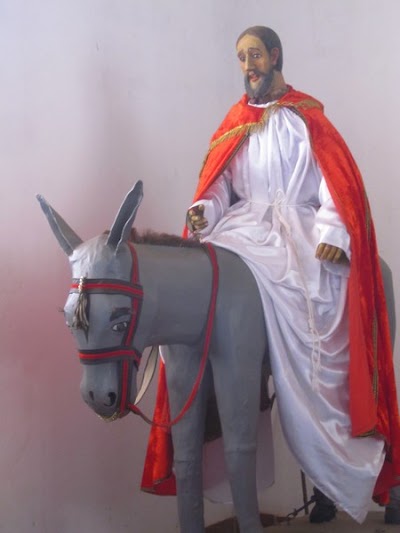 Jesus looking a bit fed up with his slow donkey.
Jesus looking a bit fed up with his slow donkey.
Soon, with five missions under my belt I reach the sixth and final one in San Jose de Chiquitos.* From here the dirt road terminates as it joins the main east-west route which links Brazil, the border of which is now 375km further east, and the city of Santa Cruz.* In fact not far from here is the original site of Santa Cruz city founded by Ñuflo Chavez in 1561, it was later moved several times as a result of tribal hostility before being relocated to its present day position 200km farther west.* The final mission here is quite different to the others I've seen, with a broad stone front* – rather than adobe - of plain red and pale orange. *It looks more like an Arabian fortress, particularly in an old drawing of the site, with palm trees and a barren, desert-like square.* Inside the mission one can see the results of the renovation work and also the discoveries found during these renovations.* Whilst carrying out the work layers of paint beneath the exposed layer revealed paintings of Spanish aristocrat….including the King of Spain, Fernando VII.** They found up to nine layers of paint, each with its own function, to teach about religion, Spanish military history and even*a layer of paintings of jungle animals to calm locals into entering with a more familiar habitat.
 Chicha seller....
Chicha seller....
 King of Spain, Fernando VII, 1810
King of Spain, Fernando VII, 1810
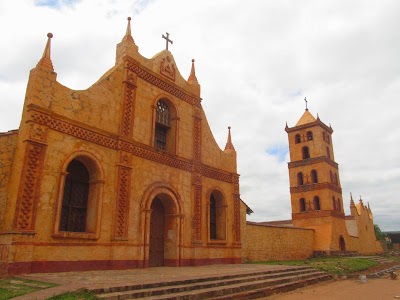 The exterior of the Arabian-ish fort like mission in San Jose de Chiquitos
The exterior of the Arabian-ish fort like mission in San Jose de Chiquitos
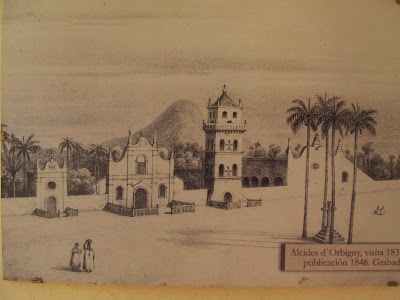 ....and how it started out (well, phase four or so, the tower was a later addition)
....and how it started out (well, phase four or so, the tower was a later addition)
The paved road bores its way relentlessly to the western horizon and to Santa Cruz taking straightness to a whole new level, and taking me to….sleep.* I wake with a gasp as the bike brrrrrrumps over cats eyes as I veer left.* Thankfully there’s no traffic. *I spend the trip trying to keep my eyes wide open, to force cool air into them in an attempt to stay awake, but…. eventually….I….fall…asleep.
I pull over to eat lunch and try to nap but mosquitoes are abundant, like a plague, instantly on me and poking angrily at my jacket. *Hungry, tired and now swelling with itchiness I move on.* I try again later but find that if anything the mosquitoes are even more virulent.* I’ll have to push on.
When I see a signpost pointing to Laguna Concepción I need little encouragement to take it, away from this paved road and hopefully to an early camp at the lagoon to rest up.* Along this dirt road, a second sign post points to some cave paintings and as always the early camp looks like it will have to wait.* It’s a narrow undulating road that leads me to a third sign, of much size but little information.* One thing is clear, I must walk through the jungle to the caves, but if five minutes or five day’s walk is unclear.* I grab my head-torch for the caves and place the helmet on the handlebar, noticing the sponge liner acting pin cushion for the many mosquitoes angrily stabbing its grimy surface in search for blood, my blood, I better get moving.
The harsh sunlight bounces off the green leaves of the jungle making them appear like glimmering mirrors. It's not the jungle like I'd expect it, tall, shaded and damp, but instead is shorter, hotter, drier. *One feature is present and overwhelming; the whine of mosquitoes and I'm forced to keep a good pace to avoid being bitten.* Even so my trousers appear almost hairy beneath a layer of mosquitoes from hem to waist.* My jacket, which I wear for protection is likewise covered and I watch the mosquitoes stab, stab, stab at shoulders and chest, beneath which I sweat, sweat, sweat.* I break of a thin tree branch and whip it in front of my face to ward off the mosquitoes trying to bite my ears, eyebrows, and nose.
The trees thin and then stop altogether, giving way to a lovely raised vantage point over the jungle, a hazy green thatch reaching all the way to the horizon.* Savouring the view costs me a dozen or more mosquito bites and I hasten onwards, only to find I can't.* I can't see where the trail continues beyond this open area.* I find it eventually and reassurance comes later when I stumble up to a sign post pointing downhill. *It tells me I'm just 15 minutes away.* From this point onwards the trail meanders downwards amongst knurly trees and hardy plants and following the path is simply trial and error. *Moments of indecision lead to a glut of mosquito bites, eye brows, lips, nose, cheeks, ears, fingers.* A stubborn bastard I fight on and on, hoping to find the cave, some little traveller’s gem secreted away, one to boast about.* Finally, after an hour or more, I reach a small mangrove of palm trees, shade and black stale water and then the paintings, a little rough, eroded away and hidden behind overgrowth, good but no gem.
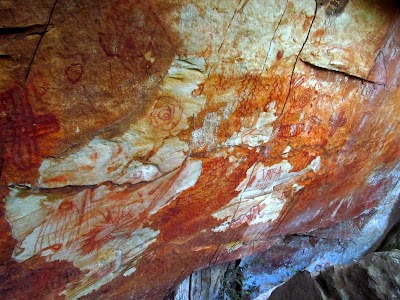 The cave paintings, not quite the hidden gem I was hoping for!
The cave paintings, not quite the hidden gem I was hoping for!
I sit on one the many fallen palm trees rotting in the damp muck of the shade, also savouring a new silence….there is not the whine of mosquitoes, bliss.* Hell is here, or at least just beyond the shade, the mosquitoes, this low jungle and I wonder if I can bring myself to leave and return to the bike.* Sitting, I remember back to talking with the Peruvian commandos in the Andes, telling me that of all the places the jungle was the worst of all.* It was unanimous amongst them, worse than any desert or Andean ridge.* I remember they complained most of the of the insects, of the spiders particularly, snakes and as well, jaguars.* They could be right, worse maybe, but perhaps not as dangerous as either. *Then thinking back to my time amongst the chilly mountains of Peru, I tuck in to my little lunch, it’s 4pm!
I walk back quickly but carefully, it’s getting late and I need to find drinking water before looking for somewhere to camp at the lake.* Coming to a fallen tree the trail doesn't seem to continue beyond it.* I’d felt certain I was on the path, but when I look back I see that the jungle floor shows no signs of a path, just uninterrupted greenery. *I’ve lost the way.* And I’d felt so certain.* I try backtracking to regain it, but there’s no way back, I can’t find it.* Things that look familiar lead me only to unfamiliarity until I’m walking tangents and lose my bearings all the more.* Lost completely I panic slightly, pushing through the trees without thought, thicker and thicker, desperate to re-join the trail. (on a positive note and in hindsight, I had at least forgotten about the mosquitoes).
Now what.* I feel sure that the path is running across the slope somewhere above me.* It’s impossible to walk directly upwards and as I’m forced one way then another by trees, plants and bushes - intent it seems on swallowing me up, feeling as if they are physically attacking me.* I waiver between certainty and doubt, scratching and bumping and falling through the green and flickering mirrors.* Pausing to weigh things up and thinking I've gone too far upwards, I look down with a sigh and notice that beneath my feet is the path….Relief.* Then the feeling I'm missing something; I pat my head, my head torch.* I have an idea where it is, a tree I’d crawled beneath, if I can just retrace my steps….But looking down the slope it’s impossible to see where I've been and come from.* Instead, hoping my guess is wrong I head down the trail, maybe I took it off when I ate lunch in the shade. *I walk back, but it’s not there and resigned I start back again*being even more careful and also curious to work out where I went wrong the first time…only to do exactly the same again.
I repeat my path almost exactly, at least it feels so, a tree that looks familiar, a piece of rock, a section that really looked like a path, a fallen tree and above it (I can still see it in my mind now), is the spot where I feel is the last hope to find the torch, but it’s not there. *I crawl under and up towards the path, feeling beaten....and there, draped over a thick prickly leaf, is my headtorch! bringing with it great happiness, greater even than finding the cave paintings perhaps!* Brilliant!
 Finding the head-torch! By now I was thoroughly annoyed, red hot in my jacket - which I was wearing for protection, the mosquitoes the worst I've ever encountered!
Finding the head-torch! By now I was thoroughly annoyed, red hot in my jacket - which I was wearing for protection, the mosquitoes the worst I've ever encountered!
Back at the bike I quickly drink the last of my water…the NEEEEEEE of mosquitoes at my ears, biting my pinkie finger when I tip the drinks bottle up, or my bum the moment I bend over the panniers to clasp them shut as the trouser material tightens to my body.* Clipping the panniers closed it is then that I notice it… it can’t be!…NO!…NO! NO!* I move around to the front of the bike, grip the front tyre and press my thumbs into it, puncture 77. (Sob)* So much for an early camp.
As I heave the bike up and wriggle the wheel axle out, my body squeezes the last of its moisture into my jacket which sticks to me like a wet towel with the added grime of sweat and a few weeks without a wash.* I wipe puddles of sweat from my glasses and tell myself as I slip the tire levers in that at least it’s the front tyre and not the back.* I'm so eager and so thirsty - and with so much practise behind me – that I fix the tyre and get rolling within 15 minutes.* Now to find water.
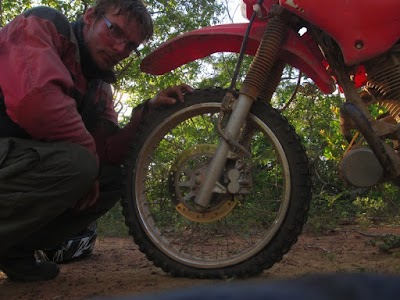 When I returned to the bike and found I had a puncture, I was pretty well going crazy....but at least it was the front tire.
When I returned to the bike and found I had a puncture, I was pretty well going crazy....but at least it was the front tire.
I ride a short way back to a very small village, a dozen houses no more, neat and tidy set around a green central square of trimmed grass.* This neatness and squareness must be a result of the few German descended Mennonites I’ve already noticed, stamping down some authority and organisation.* There’s a public water tap behind a locked gate and a metal hinge.* I go to ask a man if he minds if I fill my bottles up.* The Latino is hoeing his vegetable patch and comes over, smiling.* He’s happy to let me get some water and once done I go back to chat with him.* He explains that because of recent heavy rains there are more mosquitoes than usual.
“How do you deal with them?” I ask,
“We are used to them."
“Oh.* Right,” I say disappointed, I was hoping for some miracle tip. He stands swatting at his face, then his arm, then his other arm, his leg and then he says – with some surprise – “son bravos!” (literally, “they’re brave”, kamikaze mosquitoes, desperate for food).
It’s nice talking to him, despite the conversation revolving largely around mosquitoes, but as he points out, it’s late and I've far to go to reach the lake.* Past the trail-head and on to new ground the track becomes narrower still and has that certain something, the feeling that trouble is afoot. *The handlebars are wedged one way then jolted another between sharp rocks.* I approach a steep drop, like approaching the brink*of a waterfall; all you can see is the edge and beyond that nothing but the tops of the tallest of trees.* Here not the boom of water, instead just the putt-putt of the engine and the bump-bump of bouncing bags.* I approach the edge slowly, dragging the brakes like a paddle, slipping slowly nearer.* The bottom of the trail curves around to the left into shade and greenery, out of sight.* It’s not a waterfall of course giving me the luxury of being able to stop and think.
It’s not vertical either, far from it and I know I can take it steadily down with little problem.* But maybe the luxury of thought is not, perhaps I’d be better off not thinking!* My fears bubble to the surface; it’s obvious the trail is very rarely used and the likelihood is that there is a reason for this, one I don’t know, not yet, but one I could find ahead, something impassable.* If that were the case then I’d be forced to come back…and back up here.* The problem is that I won’t be able to, too rough and too steep for my bike and I could be riding myself into a trap.* Yes, better not to think...so I forget and push on downwards.* The ADV motto, surely, or maybe it was the Russians, "forward or death"!
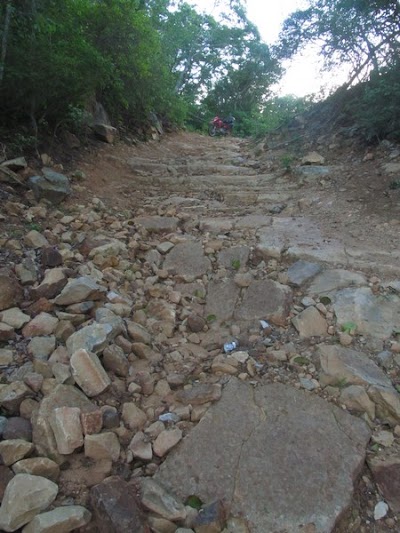 Puncture repaired and back going again, I came upon this lovely trail....the question was, what if I had to turn back, could I get up this?
Puncture repaired and back going again, I came upon this lovely trail....the question was, what if I had to turn back, could I get up this?
I feather the brakes but the rear-end threatens to overtake me on the slabby descent and I only barely manage to slow enough turn the corner at the bottom.* The trail continues then along twisting smooth dirt interrupted occasionally by large puddles filling the breadth of the road.** It’s easier but I still find reassurance when I see another motorcycle’s tire-track and I follow its weave like a friend. *I lift my visor up as visibility worsens, fading light and a few drops of warm rain fogging my glasses and visor
I see something then, in the road ahead, feint, floating, dark amongst the darkness.* I squint to try and see it, but all too soon and I'm upon it.* There’s a noise, a feeling, Dink dink dink dink, something hitting me, the visor, helmet and my jacket, too with these resonating little dinks.* Something seems to move in my vision, blurry and not vivid, like a light after you've turned it out, a half exposed image, never quite able to focus on it.* Then it happens again but this time I work it out…it's spiders!
Spiders!* I start to piece it all together now; the dark floating shape is the web somehow floating in the road, strung across it and dotted with the black blobs of them!* I hit another web, then again and again, six, seven, eight times, Dink dink dink, scurry, scurry, scurry.* Each web has a dozen or so fat-bodied black spiders which dink like liquorice drops over me to then scurry over my face and jacket and hands and – I fear – up my sleeves and down behind my collar.* I am powerless but to wince, tighten into preparation and shake them off with a shiver down my spine and a scream, “UUUUAAAAHHHH!!! hateit!hateit!hateit!hateit!”
|

25 May 2014
|
|
Registered Users
HUBB regular
|
|
Join Date: Aug 2008
Location: on the road
Posts: 99
|
|
|
The Mission - Bolivia, Part 5, P.III
I’m just beginning to think those Peruvian commandos were perhaps right after all until finally I exit the green spidery tunnel and come out into a very flat plain with mountains rising up to the right like the walls of a crater.* Across the grassy plain to the left I see the lagoon for the first time and this view, this openness comes like a release and is a relief.* Whilst I’d planned to camp lakeside the land looks marshy, the lagoon a long way from the trail through bike-deep grass, not to mention the mosquitoes which could be very bad.* I’d been concentrating so long and so desperately on just reaching the lake, that I hadn’t really stopped to consider the obvious; that it wouldn’t really be suitable for camping.
The sun dipping low towards the horizon and with my goal – the lake – reached, I now ride along thoughtless and tired, without any real plan.* Several miles on auto-pilot and I pass a group of cowboys at a small ranch as they herd the cattle into the pens for the evening.* It’s several hundred metres before I even think to stop and when I do, it is outside the central building of San Juan ranch.* A quaint red metal hut with a rustic wooden porch running right around and ahead of me the trail seems to stop, fading to a weave of horse trails.* Dotted around are burning fires to ward of mosquitoes and behind me are the cows, who moan and groan as they are put away for the night, each moaning moo perhaps another mosquito bite for one of them, defenceless.* The cowboys come over, wearing leather chaps and cowboy boots with tingling stirrups.* They wheel around in front of me, as cowboys on feisty horses are wont to do, perhaps thinking to themselves, “well what have we here boys!”
”Where you going?” asks one.
”I was hoping to get around the lake….”
”Na,” he says in the short Latin way, “Road stops here.”
”No chance at all?”
”Na.* Just horses, even then only a little way farther.”* The others stare from their mounts, arms crossed resting on the pummels of the saddle.
”So, it’s impossible to go around?”
”Hyeh.” he says with a backwards nod.
”Anyway,” says another, “it’s getting dark.* It’s very far, where would you sleep?”
”Well, I was hoping to camp, near the lake.* I’ve got everything; a tent, a bed, cooker.”* I say, patting the bags.
”But what will you eat?” asks one.
”I’ve got some rice, vegetables.”
”And drink?” asks another.
”I’ve got water too,” I say, and they look at each other with mumblings of surprise.
”Just camp here,” says the first. *He asks me without checking with the others and I look to them for approval, but they just stare.* I say yes.
They jump down then and pull the reins over the horses heads. We talk about what I’m doing here, alone, in this place.* As we chat they quickly become more smiling and friendly, perhaps reassured by the fact that I will stay.* Some loose horses gallop off in a group together around the corral and then running off in to the distance, playing in the cool air at the end of the long work day.* One of the men, still mounted takes off with a sharp kick of the heels, leaning forward as the horse pulls hard and hammers off.* Another runs off, grabs a horse tied up and in one movement springs into the saddle, gives a sharp kick and is away, “yeeooooow!! ow! ow! ow!”* After a spectacular horse show those loose are gathered back in and put away.* The men return breathing hard and smiling with excitement.
 Rancho San Juan
Rancho San Juan
Some of the cowboys leave.* Us remaining move over to a second building, shallow and wide, a kitchen, a bunk room, and outside a table.* A woman appears bringing coffee and also with her are her two young children.* She is wife to the head cowboy who invited me, though whilst the boss, he explains that he has been working here barely a month.* The others are old hands and each have several years experience, even one just 17 years of age who has been here since he was 14.* This younger one has a sharp wit and a fast mouth, perhaps picked up from working amongst men.* The head cowboy is in contrast quiet and preoccupied with his children.* Then there is Old Hand who barely speaks but when he does they are grains of wisdom to which all stop and listen.* He moves to his hammock just up from the table and swings himself from side-to-side and free of mosquitoes.
The sun has set, the cows quiet, the fires dotted around us float in the darkness and the mosquitoes diminish though never entirely.* We eat a light meal of everything one can make with milk; cheese, buñuelos (deep fried cheese breads) and dulce de leche (condensed milk, though here more like sugared butter).* No distractions such as light, TV, nor even a face or noise, complete darkness, save for us shadows.* Occasionally there is the slap sound of someone being bitten by mosquito…and conversation.
The Young Gun figures in most conversation, firing off rapid successions of words, usually followed by the laughter of all.* Often I laugh myself even though not fully understanding.* If not this then when finished speaking they all look expectantly to me for an answer.
“Sorry, what?”* I say, “All I caught was ‘hunting’ and ‘man’…… you don’t want to go hunting for men, do you?”
”No soy fresco!” he retorts a little defensively.
The men laugh all the more and I learn a few new words for “gay” in Spanish.* In fact they’ve been laughing for some time now, and me being me I wonder if it is actually at my expense.* We talk more seriously about hunting, what they hunt for, how they hunt, though I find his rapid speech so difficult to understand, not to mention*I’m quite tired too.
“So what do you hunt for?”
”Armadillo….” he lists a selection of animals so fast it’s hard to make out, finishing sarcastically with, “tigre”!
”Y hombres, claro?”
”ha ha!* No hombres, only las chicas!” we laugh and he continues, “are you married?”
”No, afraid not.* Travelling, motorcycles, eating rice, being bitten by mosquitoes and not washing aren’t exactly what girls are looking for.”
”No they just want sex!”
”And money.” mumbles Old Hand.
”But, really, not even a girlfriend?” he continues.
”Well, I have one.” I say, hoping to end it the topic.
”What’s she look like?* Is she nice?* Where is she?* In England?”
”No, she’s here, in the duffel bag.” *Plan B.
”Que?”
”I take her everywhere and only bring her out when I need to, you know.”
”Que?” he looks confused until the head cowboy chuckles and says, “mujer inflablé!” and Old Hand’s sleepy laugh joins in from the swinging hammock too.
“MiiiiERRRde!” he says, shouting the one syllable excessively and slapping the table, smiling. *(A pronunciation I quickly picked up)
“She’s much cheaper,” I add, “Shit cook though.”
“I have three girlfriends,” he continues undeterred.
”Three!?* Jesus.* Really?”
”Yeah.”
”Inflablés?!” says Boss Man with a laugh.
”No!!”
”Feas?” (uglies) I say.
”No!* Puta eh,” he says gesturing to one, “son bonitas!” he makes a gesture with his hands, two melons.* Big ones.* He says something about tetes.
”Where are they, Santa Cruz?”
”One is, I have them all over.* So, come on, seriously, you have a girlfriend in England?”
”Four.”* I say, just to trump his three.
”Ah, mi-EERRRR-de!”
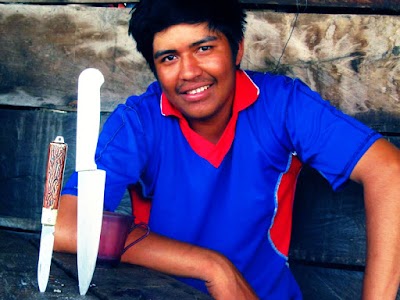 Young Gun, this guys was funny! "No soy fresco!" The names are in my diary, but these were sadly stolen later on the journey.
Young Gun, this guys was funny! "No soy fresco!" The names are in my diary, but these were sadly stolen later on the journey.
Shower time then, from a bucket with a cup and after a sweaty day, it is a great shower taken in the fragile privacy of darkness.* Hunting it seems is forgotten, maybe it will be later in the night, though nothing is spoken and already it’s late and they are all in their beds and hammocks and tents, falling asleep.* I start to put my tent up next to the bosses’ own on the porch.* I see a tarantula next to the wall, a big fella, so I set up quick as a flash, get in and zip up.* Of course now that I’ve the opportunity, I can’t sleep and as I lie reading page after page after page after page, one of the guys gets out of his tent and relieves himself off the porch.* It is punctuated by a fart, maybe a scratch and a little groan of pleasure. Through the mesh of the tent I see the fires around the ranch have died down and they smoulder away like puddles of lava.
Needless to say I wake feeling quite un-refreshed in the morning.* It’s also very early as the day begins with milking which Young Gun is clearly very excited to show me.* The men gather tiny one legged stools to sit on, and clean plastic buckets.* The wife comes over holding plastic mugs, each with a shot of coffee. *These are passed around and each fills his mug with frothy milk straight from the udder to make a freshly whipped cappuccino, what a treat.* Whilst I feel like pushing a cow onto its side and using the udder as a pillow, the younger cowboy is exuberant and asks repeatedly that I take his photo as he feverishly milks his cow, yanking the teat hard into the very depths of the bucket, moaning that the milk just keeps coming the bloody udder won’t stop.* The cow looks bored.* Then Young Gun tells me to take photos of Old Hand and Boss Man’s too, “le-me-see!* Le-me-see!* Ha HA!* MiiiiEEERRRRde!* Take one of us both!”
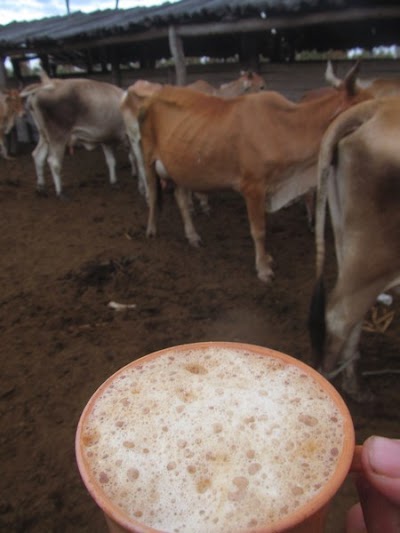 After a bit of dinner and a good chat, morning came. I was asked if I wanted to milk a cow....the woman of the farm came with mugs and shots of coffee, a squirt of FRESH milk and a cappuccino awaits!
After a bit of dinner and a good chat, morning came. I was asked if I wanted to milk a cow....the woman of the farm came with mugs and shots of coffee, a squirt of FRESH milk and a cappuccino awaits!
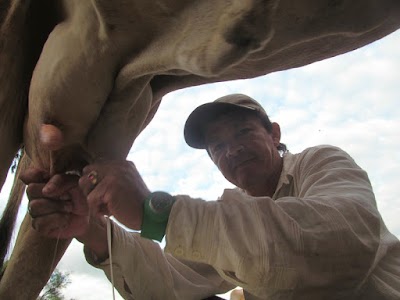 One of the great chaps, this was Wise Chap.
One of the great chaps, this was Wise Chap.
I turn and see a large American silver pick-up truck, though I never saw it arrive. *It's the owner of the ranch, a city man, fat and with fashionable clothes.* Other cowboys are here now too, from another section of the whole farm, six all told, plus a mechanic who is talking to the owner and looking at an old tractor, a hand-down from the Mennonites.* The first time the owner speaks to me is to ask if I will go and collect some spare parts for the tractor from a local store.* I can’t even begin to imagine that there is a store here and* I wonder if I have misinterpreted, surely he means Santa Cruz?* But no, he tells me it’s close and so I agree, “OK sure, no problem.”* He adds that I should take the mechanic as he knows the part needed and he can also guide me there.* I unload the bike of all its luggage and off we bumble.
Normally with the luggage on the bike handles quite badly, the overloaded, deeply sagging suspension wanting to buckaroo the pilot off on any bump.* So with a passenger twice as heavy, it’s like steering a medieval catapult through the jungle.* We reach some derelict buildings which I recognise from last night.* Beyond here is the spider tunnel and the steep section of rocky road. I fear the worst but what I didn’t realise is that the road actually forks here around and behind the buildings and we can continue around the south side of the lagoon.* Whilst easier – and less spidery! - there is instead sand, mud, extremely deep ruts and deep puddles.* These deep puddles fill the road making them tricky to ride around, the jungle encroaching on the sides snagging bars, pilot or passenger and always the puddles of thick gloop angled like craters which the tire fights desperately against by its very edge.* The deep ruts twist off into the distance around corners out of sight, making line choice critical. One picks a line and must then stick to it, only to find an obstacle and having to man-handle the bike across a rut to continue, only then to find the ruts criss-cross each other leaving one stranded in the middle, or else the rear wheel drops in leaving us sideways. *After 37km of falling we reach more open arable land only to be overtaken by the big American silver pick-up.* Soon after and we reach the shop, a white clap-board house set amongst huge rectangular fields of maize, through which bumbles a tractor piloted by a Mennonite man in blue overalls.
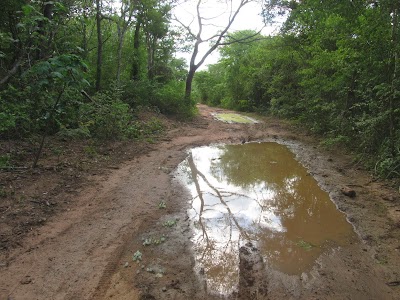 Slippery as a fish
Slippery as a fish
The ranch owner steps from his silver pick up, that rich son of a bastard, and queries why it has taken us so long, despite us being filthy with mud and sweat.* “I thought the motorcycle would be really fast!” he says.* I could say that it is because of assholes using their pickup in the rains that there are impossibly deep twisting ruts, but actually and in all fairness, he says so himself, minus the asshole bit, “I suppose I really shouldn’t use the track in the rains.”* He buys us all a soft drink each and between us a pack of large pack of biscuits as our breakfast.* We are served by what is best described as an Aryan boy.* As blond and tall and blue eyed as one would expect, wearing a set of pristinely pressed navy blue overalls and a checked shirt with its sleeve cuffs rolled millimetre perfect and square just above the elbow.* His mother sits sternly besides him behind the counter, nursing baby.* She is not permitted to speak Spanish, she is silent and talks only with her eyes.* The boy, perhaps 15 years old, can speak to us (being male) and his face says his mother will give him a ruddy good clack if he falls out of line and as such he is as diminutive as a mouse.* The shop sells just about everything, from toys to fan-belts.
“Amazing isn’t it?” says the son of a bastard.
”It sure is, they seem to have everything.* It’s like Walmart crammed into a post office.* How did you ever find it?” I ask because from the outside it is just another German-esque house in the middle of a vast expanse of crop fields and other similar German-esque houses.
”Hmm, I don’t know, I think someone must have told me about it.* Otherwise you’d never find it!* Come on, eat the biscuits, help yourself.”
”Thanks!”
”Did you get breakfast?”
”Well, just some coffee.”
”Eat then, you must be hungry!” and we all tuck in then quite greedily.* “So, you are travelling all over the Americas?”
I reply, but he doesn’t listen.* It’s clear he is more interested in his question, his voice, whatever I have to say is worthless to him, and his question seems almost a display of power.* It’s clear in his presence that neither the mechanic nor the other cowboy should speak unless spoken to and whilst before they were friendly now they only eat biscuits quietly.* Next to each other the differences between the Aryan boy and the Son of a bastard seem even more apparent, with the boy being perfectly respective and well-mannered.* The bastard reminds me of a gringo running a mine.
Outside he talks some more, his slaves occasionally giving mutterings of agreement.* “They are very strange people,” he says of the Mennonites, waving a biscuit in the air as if it were a cigarette holder or an epiphany, and adds* - gesturing to a home made lawnmower, an ingenious amalgamation of a toy car and a bicycle - “but very clever.”* He eats something else then, something just for himself which is not shared.* He offers me some, I decline.* He thanks me then for helping with the parts, “Thanks.* Now I don’t have to waste my time driving back.”* Extremely satisfied with himself having saved himself a job he gets in his pick-up and drives off, taking along one member of the team to the city as he has time off.
Myself and the mechanic start the long ride back to the ranch.** We get stuck in some mud on the way, but as I become more accustomed to the additional weight and also knowing which lines best to take, we fall only once or twice, a vast improvement.* It’s lunchtime by the time we get back, feeling as if I’ve done a full day’s riding and famished.* However, no sooner are we back and Young Gun is there chomping at the bit to go fishing. Despite tiredness and hunger (nothing unusual), his enthusiasm, the kind invite and without the option of a cool dark hole to crawl into, it is impossible to decline, so we saddle up the horses and go riding towards the lake.
My horse is stubborn and slow (not unlike Rodney then), with wild unkempt fur like fuzzy felt.* It will only follow the others reluctantly and rejects all of my commands, in Spanish or – rather harsh - English.* As we go we cut off two branches of trees with the machete and later, after a bit of a search through the bush, find a dead cow and slice off a piece of rump.* “It wasn’t as dry as I expected,” says Head Cowboy, “I thought it would be tougher by now”.* Perhaps it’s been there a while, it sure looks as if it has.
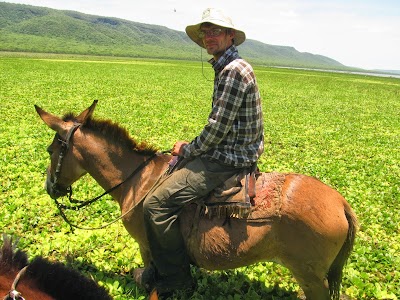 Slow Joe
Slow Joe
My horse stops to munch on some leaves occasionally, but eventually me and my furry companion reach the lake, though some time later than the others who wait with smiles. *It’s a lovely spot and the view here is of the wedge of mountains to the left and the vast plain of the lake, smooth water that looks deceptively as if we could walk upon it, to the horizon and out of sight.* The water here barely reaches the horse’s knees and so flat is the land that we can walk a long way into it, and must do, to fish.* This also means that the surrounding grassland plain is only barely above the water table, and is therefore a terrible bog, hard going even for the horses, and a good job I didn’t try to camp here last night.
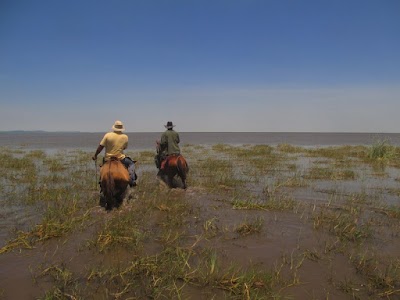 After running some errands for the farm, involving a 74km trip up the muddy trails to a shop I came back to be asked if I wanted to go fishing for piranhas! Sure thing, want to go on horse? You bet!
After running some errands for the farm, involving a 74km trip up the muddy trails to a shop I came back to be asked if I wanted to go fishing for piranhas! Sure thing, want to go on horse? You bet!
We stop then and prepare the two coils of fishing lines which we bait with pieces of the dead cow which I cut with a sharp folding workers knife.* Thirty seconds later and we have our first bite and the piranha is slotted onto the branch we cut earlier through its gill and out through it toothy mouth.* The second catch takes much longer.* We bake in the openness of the lake, occasionally the horses cool themselves and us by flicking water with whips of their tails.* A little way off a caiman skulks in the water, a pair of nostrils and a long nose leading to a beady eye.* Young Gun took first blood but the Boss then catches seven in quick succession making Young Gun a little angry. *“MiiiEERRRRRde!” he shouts as another one slips from his hook and returns empty, “more bait!” he snaps.* We have enough fish to feed us but The Boss wisely waits patiently and even seems to let one or two piranhas go on purpose as others nip at the horse ankles. *Finally number nine is caught by the Youth and with all satisfied, allows us to begin the ride back to the ranch.
 30 seconds, number one caught! We caught nine all together to feed us for lunch, the poor horse got nipped a few times! There were caimans too!
30 seconds, number one caught! We caught nine all together to feed us for lunch, the poor horse got nipped a few times! There were caimans too!
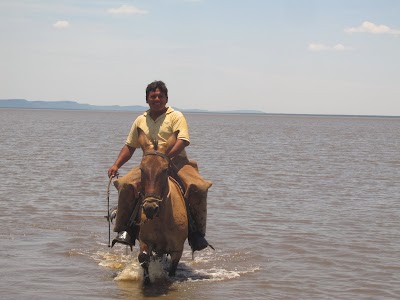 Boss Man, looking happy having caught seven fishies!
Boss Man, looking happy having caught seven fishies!
When we return to the ranch the tractor is almost completely rebuilt.* While we were fishing I’d been asked to repair a puncture on Young Gun’s motorcycle and I get started on that and the wife begins scaling the fish and barbecuing them over wood. *She makes a fine meal, though from which she receives only seconds and leftovers.* The children get the fish-heads which they eat messily with entrails hanging from slimy lips and fingers.* The fish is excellent however, though full of sharp and slender bones which makes the meal slow, noisy and messy.* I’m even more tired now than the day before, feeling as if I haven’t really stopped since waking up yesterday.* The guys try to persuade me stop another night, “we’ll kill a pig and eat a BBQ”.* I can tell they really want me to stay, perhaps not to share my own company, which is poor, but for the novelty and distraction I can offer them here on the secluded ranch and its repetitive normality.* However, I can see things soon moving from the jolly banter to short-tempered boredom.* It’s already late in the afternoon and whilst it makes little sense to leave now I don’t want to ruin the otherwise good memories we all share.* Truthfully I am not naturally sociable at all and have to work very hard at it.* Up until now I feel I achieved relative success, and to me that’s almost all company ever is, a game, a score.* How did I do?* Did I make them laugh, happy, thoughtful, interested, inspired?* Or did my jokes miss the mark, was I dull, was I selfish, tiresome, did I say something I shouldn’t have?* Did I win?* The prize; a friend.* But now, tired, I’m worried that whilst I’ve done well, I can’t keep this game up, and eventually I’ll lose.* I’m scared to lose.* So I apologise and say genuine thanks a thousand times, but decide to leave.* Better to leave victorious.
I make it out from the muddy road of the lake in good time and stop at a place for a drink, making the mistake of saying hello to one of the Mennonite Women who scowls at me.* The Mennonites sit all together, a large family drinking soda from a large bottle, talking with the store owner, who herself does little but take my money.* Boys run barefoot, blonde-blonde boys and girls too, like nymphs or pixies straight from the forest with eyes a wild blue and chunky dirty feet with thick soles.** I sit at my table as they sit at theirs, listening to them talking a strange mix of German and Spanish, happy and content.* Alone I wonder about leaving the cowboys, the ranch and their kind offer.* One can spend their lifetime wishing for things and wishing to be a certain way, but sometimes one must accept that we are who we are.
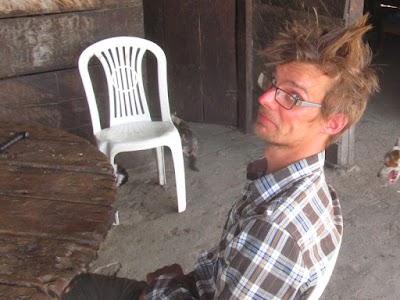 Post lunch Nick, after milking, riding 74km to the shop, fishing and repairing the guys motorcycle tire, I was pretty tired...I was worried about overstaying too...and got going.
Post lunch Nick, after milking, riding 74km to the shop, fishing and repairing the guys motorcycle tire, I was pretty tired...I was worried about overstaying too...and got going.
I stop at houses along the way, looking for food supplies for the evening but the only option they tell me, is to reach the main road and the few shops there.* When I reach them a woman shop owner asks if I will help three others carry her concrete sink to a truck, she had ordered it but it is the wrong colour. *In thanks she gives the men  and – obviously a good judge of character – gives me a coke.* She is friendly and tells me the way to a house which might have some fresh bread.* I follow her directions carefully, up a dusty street and into a large open courtyard of a house where I find a young girl playing with her imagination, she’s perhaps seven years old.* Her mother comes out, a timid woman, says she might have some bread and goes off to look.* With her gone the curious little girl asks me many questions.* She is more inquisitive than any adult I have met and as wise as an old woman.* I tell her mother as much when she returns with a small plastic bag of steaming hot breads like English muffins, and she agrees that her daughter is especially intelligent.* It’s hard to see what this intelligence will gain her here in this village supported only by the passing traffic on its way to Santa Cruz.* The inhabitants here are not even farming now as the Mennonites – the Latinos admit - can do it so much better and so much cheaper than they can thanks to tractors and great swathes of land, “they can sell it cheaper than I can grow it!” says one man.* The woman’s bread however, is delicious and cheap…tough even for the Mennonites to beat!
I return back into the hot prickly bush on the fringes of the Chaco (more anon) and find a large open patch amongst it all, perhaps an area left over from the road building in the past.* Despite the lack of grass and considering the large distance from the lake, the mosquitoes are ever present.* I quickly start a fire (a rarity for me) which keep all but the hardiest away, though sadly they have many hardy specimens amongst them!* It forces me to retreat into my tent, filling with billowing smoke and even more heat, I surely can’t move the fire and I sure as hell am not going to move the tent so I take what little comfort I can in knowing that at least it’s cooler than Pilcomayo Canyon!
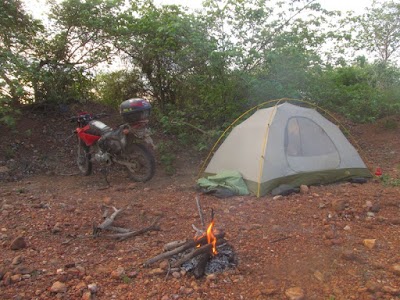 I very rarely make a fire, but the bugs demanded it....it helped, but only a little!
I very rarely make a fire, but the bugs demanded it....it helped, but only a little!
In the cool of morning there are few mosquitoes and I can leave the confines of the stuffy tent to enjoy breakfast, sat in my underpants.** With the air rapidly warming I think about packing up, but I’ve been waiting patiently for this time of respite and feel reluctance to move.* A toucan flies overhead and I soon forget my lethargy, throwing down my bowl to chase it, to see it, but too soon and it is gone.* Not long after and the heat has become heavy as a weight on my back and I pack sluggishly. *Finished, I'm then eager to get moving and feel the cooling breeze on the motorcycle.
Along the way, straight and paved and I see many Mennonites.* I have seen Mennonites before, here in recent days and in Mexico where I passed through, each of us staring at each other in some amount of awe, not really understanding each other.* I see them sat rigidly and regimented in horse-drawn carts going about their business, often with a 200litre fuel drum angled in the back. *Even so they look a bit out of place lining up at the petrol stations in their horse carts.*** From the rear, all that can be seen of these carts apart from these fuel drums are a tall gangly blonde man holding reins and women and girls in broad straw hats or bonnets.* Captivated more than I have been before I pull off the main road to try and get a closer look, but they seem to disappear once away from the main road and I find only Latinos.* I return to the main road and continue, all the while looking for German sounding village names on signposts, hoping for a clue or a way in but all I see are signs saying “No Caretas” (no horse carts!). *Before I know it I’m at the outskirts of Santa Cruz and its concentric set of ring roads of increasing traffic.* I’d have to look harder….
|

1 Sep 2014
|
|
Registered Users
HUBB regular
|
|
Join Date: Aug 2008
Location: on the road
Posts: 99
|
|
|
New Blog Post
NEW BLOG POST - Mennonites, Bolivia Part 6
Quick Summary:
Having completed the Jesuit Mission circuit I was back in Santa Cruz, hanging out with the “Quirkies”, looking for Mennonites and feeling sorry for market girls. I travel back in time to the 1940s and the Riva Palacios Mennonite Colony to visit a family, before returning to the mountains near Samaipata to hunt condors…..
The blog post is HERE
-------------------------------------------------------------------
eBook Files:
Kindle File (mobi)
ePub File
-------------------------------------------------------------------
I'll post it here eventually, but for now....
|

13 Sep 2014
|
|
Registered Users
HUBB regular
|
|
Join Date: Aug 2008
Location: on the road
Posts: 99
|
|
|
Budget update
Quote:
Originally Posted by klous-1

Budget
Recently, I've been looking at my budget as some would-be travellers were asking trying to make their own plans, and maybe others are interested too.
This is a rough calculation, certainly not exact, and I'm working a lot from memory (so please forgive me if I make a mistake and amend later, but I think it's all here and okay), hopefully I've not forgotten anything.
Since September 2010 when I landed in San Francisco, USA until now December 2012 (Bolivia) I've spent roughly $13,000. This is working it out with an exchange rate of 1.6 US$ to 1GBP (I'm British so work in pounds usually, but for easy understanding for all).
This includes;
A new bike in Guatemala - (18,500Qs) $2350
A visit/flight home $1250
Replacement of worn out camping stuff when I went home, $1000
Crossing Darien - $450
And $500 on health insurance.
I worked in Guatemala, and at home when I visited a total time of about 5 or 5.5 months, I also sold my old car (and had to pay to get it road worthy to do so!, I forget how much that was)....but hopefully this gives some indication. I don't think this includes shipping my original bike (...that later broke in Guatemala) from South Korea (where I worked after the Africa stint) which cost $1000, as I paid for that in Korean Wan and so from another bank account.
|
Update on the budget:
Obviously I knew Arg/Chile was going to cost more, largely because of long distances covered (I have one bank statement ranging from an ATM in Ushuaia all the way to Asuncion (Paraguay)!) and fuel costs.
Because my diaries were robbed I'm not sure about mileage covered, though I know both bikes together has been 175,000km, though this mileage accounts for Africa too (which the budget doesn't). I would estimate 100,000km for the Americas.
So, from the previous update in Santa Cruz, east to northern Chile, then south, and north a bit, then south a lot to Ushaia, then all the way back to Santa Cruz, selling the bike (I still have that money, it's in dollars), bus to LA Paz, climb a big mountain and flight home:
A rather large $6674
With the only major expense being a camera $180 and the flight home, $800 and of course fuel.
So total for the Americas, $19,674.00, 100,000km and two months shy of three years.
|

31 Jan 2015
|
|
Registered Users
HUBB regular
|
|
Join Date: Aug 2008
Location: on the road
Posts: 99
|
|
|
Mennonites - Pt 1 of 3
 Mennonite girls looking back from their horse carriage (Image © AP)
-------------------------------------------------------------------
eBook Files:
Kindle File (mobi)
ePub File
-------------------------------------------------------------------
A paved road leads me west towards Santa Cruz city. *The road is straight and flat and to the sides the land is green but completely featureless, no trees in sight. *I see some wooden shacks ahead then, a traffic cone in the middle of the road, just one, and beside it; a police officer.* Sometimes I can sneak through but this time the officer raises his hand and I have to stop. *I pull over on to the hardpack dust, there is litter, dogs, diesel fumes and heat, the throaty cough of trucks and buses coming and going. *The shacks I saw are vendor's stalls, small restaurants, taking advantage of the stopped traffic. *All this for a cone and an officer. *The officer is friendly though*and can't contain his smile, chatting excitedly and giving my driving license nothing more than a cursory glance.* Like most people he asks where I'm from, where I'm going, why my number plate is missing and - as is becoming more and more common - if he can buy my bike, to which I explain that he can't because it's not Bolivian, it's foreign registered.
"Pah! no problem!" he says, slapping his hands together, wiping the scandal clean away as if a little dust, "it's just a piece of paper and this is Bolivia!* How much do you want for it?"
I ruminate and the officer beings to tap my license against his hand impatiently turning out his lip, raising his eyebrows suggestively in encouragement. "Well," I say, "I still have to go to Argentina and -"
"What for?"
"Well, what do you mean, I don't know, I want to…"
"But why?* Just take the aeroplane."
"But I won't see anything!"
"So, take the bus!"
"Look, I'm riding to Argentina and then I have to come all the way back!* By then the bike is probably going to be complete junk!* If I'm lucky maybe $1,000?"
"$1000!" he says as if I must be mad.
"Yeah…" not sure if he thinks it's too much or too little.
"But is Honda no?" he says, frowning down at the bike, "Pah!* Is too cheap, it's worth at least $1400." *I only paid $1800 and knot my face in disbelief until he adds with a twinkling smile, "…but I'll take it off you for $1,000!"
I reply that I will come back after Argentina.
It takes me a long while to find a hostal in the city centre, but eventually I find a good budget place with just enough space to squeeze the bike into the entrance-way.* The hostel is quite basic, run by a laid back tubby couple who shuffle about the place, cleaning occasionally but mainly sitting for marathon sessions in front of the TV.* The rooms are Spartan but nice; no dark places holding creepy unknowns or bad smells of a creepy past. *And, whilst the mosquito mesh is untorn it is stretched between wonky frames and the clumsy clattering doors likewise fit like square pegs in a round hole.* There is a squeaky metal bed with a sunken mattress and a bedside cupboard perfectly sized to store vile smelling boots.

Boot locker
Despite the slightly rough edges, the place is kept very clean and tidy, leaving the only other concern with budget accommodation; the clientele.
When a traveller buys a ticket to anywhere, they are actually buying a pass.* This pass permits the removal of all the shackles society has placed on them, leaving them free to be whoever they want to be, think they are or just who they actually are.* Hostels therefore are the assembly points for these oddballs on extended day-release. *There are those that are amusing, interesting, peculiar and often quirky, living the lives of bums on a semi-permanent basis.* There are those who have fully embraced the travelling lifestyle and who do absolutely everything in their power to say, "I am a traveller," they appear to be sponsored by an artisan market and drink "mate de coca" (tea of coca[ine]) as further testament to their traveller status, they've probably worked on a farm, most likely they can juggle.* Then there are groups of guys, three is the magic number, often with matching beards and matching clothes, at least one guitar between them, their Spanish begins at Hola and ends at Gracias, after ten days drinking in Santa Cruz they'll get a bus to Sucre and start over, then they'll go to Cusco and get pictures of Machu Picchu and everyone will think they are legends (yes, yes, I am a condescending shit), they probably can't make a decision individually by themselves, they try hard to walk in step with each other.* There are couples too, inseparable, impenetrable, except to other couples, terrified of soloists, believe us to all be rapists, serial killers or just shits judging by looks given to us.* There are those who seem to dislike travel, or perhaps they've just started, not quite in the swing of it ( I remember the days!), they appear to have just stepped out of a North Face catalogue and into a land where the drab pastel shades stand out just as much as an Indian waiting in line in KFC holding a spear and with his penis strapped up in a piece of bamboo would, they look scared when people say hello and cling on desperately to a smart phone, a laptop, the West.* And finally there are "dodgy folk," often out for long periods of the day and night, they leave looking edgy, and return looking edgier still, pale, greasy, slimy even, looking - you feel sure - to steal your socks the moment you put your feet up.* We all share one thing in common, we all eat noodles.* And actually, here in the Santa Cruz hostel, I must say they were all very nice noodle eaters and I was instantly happy.

The courtyard of the hostel, tranquilo
The shaded rooms of the hostel are set off from a narrow open courtyard of bright sun, white walls and hot terracotta tiles.* Chairs are occupied by baking towels whilst people hide within the cooler interior of the rooms to sleep until late in the day.* As the sun and temperatures drop so too the quirky characters skulk out of their rooms to feed, bask, drink, talk and to read.* I read whilst a group of German girls and lecherous Latin males bask, drink and talk.* Talk which seems a bit inane, a load of preamble, foreplay.* I sit staring at my book, the same damn page, wanting them to be quiet, but I can't help but eaves drop, and wish they would just go and have sex already!* Jealousy.* As I read a man comes over, dressed for safari, a bit Ray Mears, and picks some leaves from the plant next to my chair, to make tea, as one of the Latinos – not very Ray Mears - comes and stubs his cigarette out in the pot.* A couple passes by on their way out and I smile at them, the man doesn't notice me but the girl scowls at me like I've occupied*the hostel's honeymoon suite.* Sitting opposite me is another reader, and as I wonder what my face must say to people to deserve such scowls, I also wonder how long he's been there, and what he's thinking, maybe he can help me not be so cynical.
"Do you think they'll ever shut up?" he says.
"Funny, I was just thinking…."
"Jesus, she's got a nice ass though."
"Mm." We look a moment as she gets up to rearrange the towel on her chair, a silence falls as we, the Leeches and all others in the vicinity – except Ray Mears, quite busy with his tea - take a moment to leer until too soon she sits. *Immediately conversations resume all down the courtyard.* "Nice everything," I say, "except her voice, siiiiii yarrrr, grarseearse!* You know sometimes I think my Spanish is sort of okay, and then I hear someone like her and I start to wonder if I sound like that?"
"You speak Spanish?"
"Well, a bit, you know, I get by."
"That usually means it's good."
"No…it's not honestly.* Well, I dunno, some days I think I've totally got it,* I can understand everything and talk with people for hours.* Then other days I can't understand one word, not one, and I wonder what people must think of me.* You?"
"Well, actually Spanish is my first language, I'm half Bolivian." (though his accent suggests USA).
"Ha!* No way!* From Santa Cruz?…I'm jealous!…"
"Nah, come on…!"
"Well, I just mean it must be so nice, to understand everything.* I wish I could, especially in groups!* I'm terrible in groups!* I suppose I should study more….What you reading?"
"Well, it's kind of funny, I've just got off reading Maugham….." he pauses and I nod an "ahhh, Maugham" face, "I'm telling ya," he continues, "that thing was massive!* Practically a cube…MASSIVE.* God forbid I ever dropped it, I virtually had to winch that sucker back up to the lectern," he pauses for effect, thinks he's on Broadway or something, "….anyway, so now I'm reading Jurassic Park."
"What?"
"Jurassic Park.* After Maugham I sorta needed something a bit lighter, you know?* So, I was a looking around the shops, right, and there isn't really much in the way of bookstores here, it's kinda hard to find anything, just Clive Cussler, Twilight…and then I saw…"
"Jurassic Park?"
"Yeah, right!" he says, "This Crichton guy is badass, I'm right there with those raptors."
"Hmm, well perhaps I should check it out!"
"You like Hemingway?"
"Huh?"
"Hemingway, you like him?"
"Oh yeah!* Actually I'm reading Moveable Feast!"
"If you are lucky enough to have lived in Paris," he begins, " then wherever you go for the rest of your life, it stays with you, for Paris[I join in] is a moveable feast." the book's epigraph.
"Jesus, that's quite a memory."* I say.
"I'm studying Hemingway for my doctorate." His phone rings then, it's his girlfriend, asks what he's been doing, "you know, reading Maugham, went to the bookstore, studied, wrote a little."* So, he's one of the quirky bums I think and the German girls erupt into booming deep laughter.
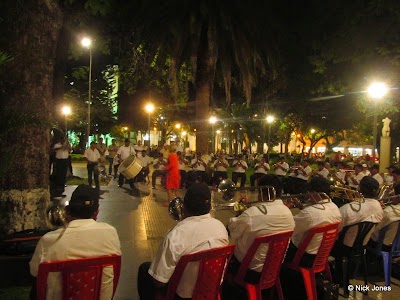
The orchestra sets up in the plaza
Nico and I walk into the city centre to sit in the plaza and watch the girls watch the boys, watch the world go by.* Nico believes that almost every girl is into him.* Maybe they are, I wouldn't know.* I can't remember ever seeing a girl and thinking, "she's into me".* I'm not saying they don't think it, just I've never seen it, most of them look at me as if I've just dumped them.** Opposite us is a chess*table where a frantic game is being played out, the men serious, narrowed eyes, the pieces slammed with resonating clacks from square to square and watched by a crowd of old men on tenterhooks.* Children are chasing the pigeons around the fountain, or else feeding them and a large brass band is setting up.* Up in the trees birds squawk and a group of girls laugh amongst themselves as they pass by us and sit on the bench next to the chess*table.* The girls are perhaps 18 years old, but that is of no concern to Nico. "If she looks up and looks at me," he says of one in particular, "then she likes me…" I wonder if it's that simple, if she might instead look at me and not Nico.* Then, right on cue, she looks up, at Nico, "booom!" he says.
"Nico, she's about 12!"
"Well, you know what they say.* Old enough to bleed, old enough to breed."
"Yeah, right, grass on the pitch and all.* But seriously."
"What, you wouldn't?"
"You would?"
"Sure!* What, you think she's too young?"
"I don't know, I guess.* I mean, how old do you think she is?"
"I don't know, 18?"
"More like 16 I reckon."
"I slept with a 13 year old once."
"What?* How old were you, 15?" I reply.
"Nah, I was 30.* She was a hooker."
"And thirteen?"
"Yeah, It was my birthday, and my uncle got her for me, I remember it, he called me over, said, hey come here I got something special for ya, took me through and there she was."
"What, and you…."
"She liked me, I wasn't her usual type of clientele, you know, not some fat old sleazy guy, I could tell she was in to me."* I didn't tell him that he thought every girl was into him, "and she loved it, obviously had a lot of experience.* You know this guy here," he says pointing to a man walking by.* The man pushes a trolley carrying green and cream coloured thermos flasks – coffee and milk - and small paper cups, he wears a cream suit with green cuffs and collar, sort of like a chef or a doorman, but with the triangular hat of a burger boy. "He's been selling coffee here for 40 years.* He started all this," says Nico, meaning the coffee trade in the plaza, as many others now sell it, "but his is the best coffee.* You been to the museum?"
Nico and I would spend a few evenings hanging out together, talking about his sexual escapades, or watching his magic tricks and slight of hand, or watching boxing at his local club as the women spectators shouted "kill the pig!"* Then we'd head out to eat skewers of chicken hearts or sit in a juice bar.* I liked Nico, his intense stare, sharp intellect, extreme memory, rapid changes in conversational direction and even the way he'd never laugh just say, "ha, that's funny," but I'd never hear from him again and I knew it even then, for him it seemed I was just a spectator.
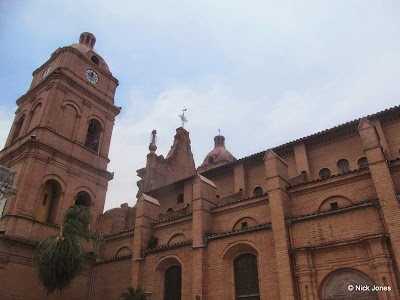
The main church in Santa Cruz

A tense chess game
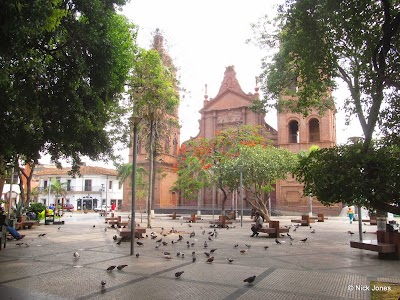
The early morning plaza in Santa Cruz
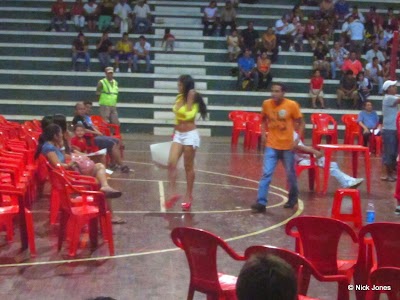
Watching the "boxing"
|

31 Jan 2015
|
|
Registered Users
HUBB regular
|
|
Join Date: Aug 2008
Location: on the road
Posts: 99
|
|
|
Mennonites - Pt 2 of 3

Seeing the lawyer to extend my customs papers (I didn't even have to do this at the border!)
In cities my plan is simple; walk around.* But, with every street in the Santa Cruz grid looking almost identical, the same pale white walls and wonky terracotta porches, I often find myself walking in circles trying to find the juice bar I'd passed yesterday, the market I'd seen five minutes ago, or just trying to find my way back to the plaza, the hostel.* After a few days in the city I've worked out my favourite vendors and make sure to buy from them every day (if I can find them).* I'm not sure why I do this, maybe a friendly face and some conversation, or perhaps because the fruit girl lets me try all the tropical fruits or because I feel sorry for the timid juice-bar girl working for the overbearing owner and I just wanted to be nice (actually I felt sorry for the fruit girl too, she worked very long hours).* When I'm not lost or buying things needlessly from people I feel sorry for, I am extending my visa and customs papers in two packed offices whose "systems" only a sadist could have devised.* Most annoying is that it is much more complex than the border.* However, the time spent queuing in immigration does give me chance to watch Mennonite families obtaining their visas and perhaps passports, standing there quietly, patiently whilst the locals around them fan themselves, agitated, vocal.* It reminds me that I really need to find out more about them.

The fruit girl who left her house at 5am and returned at 11pm 6 days a week
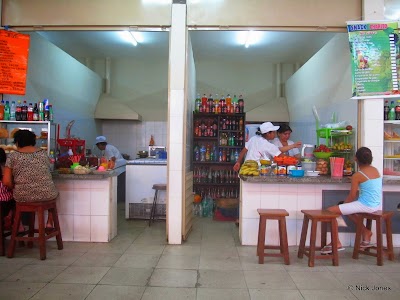
Juice bars, mix ice, sugar, milk and fresh fruit, yum yum yum
The first Mennonites came to Bolivia initially from Paraguay, though their roots take them back as far as Switzerland, Germany and the Netherlands.* Not to be confused with the Jesuits of course, who also arrived much earlier, nor even the Amish, the Mennonites didn't arrive in Bolivia until the 1950's and at first just twelve families. They have been a people always on the move, migrating from country to country in an attempt to maintain their traditional way of life, one that eschews electronics, radio, TV, alcohol, cars, bicycles, sports and music (other than their own religious music), violence and war, they do not pay social security, health insurance nor do they accept benefits, they wear "plain clothes", speak Plautdietsch (low German) and live in fairly sequestered communities whose education consists of the bible and the farm.
 From Google Maps
Those families now in Bolivia could trace their ancestral movements for example, through Paraguay, Belize, Mexico, Canada, Russia, Prussia and all the way back to Germany.* As Anabaptists, their migrations were initially a result of religious persecution from European Protestants and Catholics.* Whilst today their religion is more widely accepted, other, contemporary pressures remain from surrounding society; their surrogate country's legal requirement of standard education, forced use of the country's language or military service requirement.* If not from surrounding society then the problems stem from within the colonies; lack of available land and water due to rapidly increasing colony population, or in disagreement with their colony's adoption of more modern methods of living; use of electricity, computers, mobile phones, rubber tyres, or even cars. Moving to Bolivia, the Mennonites were offered land in the Santa Cruz region, on the fringes of the Gran Chaco, a semi-arid jungle with a harsh climate; extreme heat and dry winters.* For those newcomers the difficult climate meant life initially consisted of just barely subsiding.* Now though, they prosper, growing vast amounts of soy and sorghum and manufacturing dairy products in an almost industrial way.* Whilst these farms are small taken one by one, the burgeon of population thanks to large families (sometimes twelve children each), means that the environmental impact the Mennonites (and others in the region) have made is vast.* Drive any road in the area (or just look at google maps) and one thing is clear, they have taken a lot of land.* Land that was once low thick jungle is now a patchwork of open fields, long, narrow and perfectly flat, tilled to the horizon with hardly a tree in sight….though sometimes a tractor.
One tradition they would prefer to lose, is that new problems are just around the corner, to hinder their way of life, and in Bolivia today there are perhaps two main threats; land-reforms and an influx of non-Mennonites and accompanying vices; drugs, alcohol, consumerism, electronics, music.* With president Evo Morales looking to give back land to the people and claiming that some of the Mennonites have taken land that wasn't theirs to take, the Mennonites could find themselves without a home, or else with a large debt.* Non-Mennonite locals however, think otherwise, stating that Evo won't be as foolish as to let the Mennonites leave, after all they are not just feeding themselves, but a large part of the nation. For now they are here and in Santa Cruz they are always to be found visiting the same place, the far end of the market, farthest from the attention of the main centre and closest to the ring-road out of the city.* The men and boys still wearing work-overalls and navy truckers caps, spotlessly clean and pressed to absolute perfection despite the heavy heat and crazy bustle of the market, the women in their plain cut, homemade, floral dresses, wire framed spectacles and bonnets or straw sun hats.
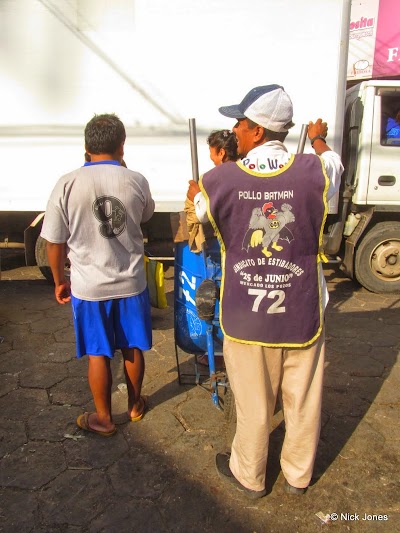
Batman Chicken Porters

Pineapple sellers
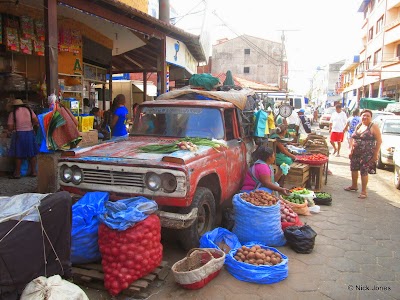
Not a tow zone, but best not to park here
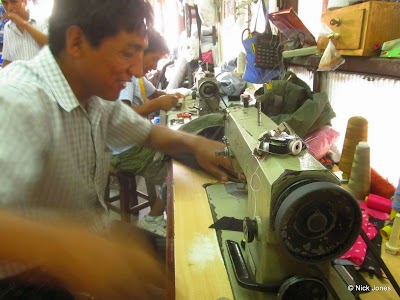
Repairing my trousers

A young vegetable seller
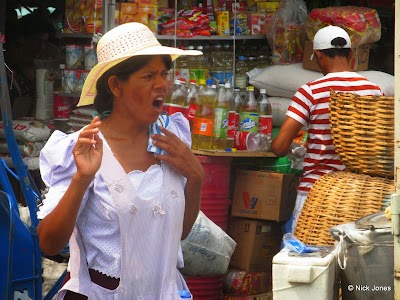
How girls normally look at me 
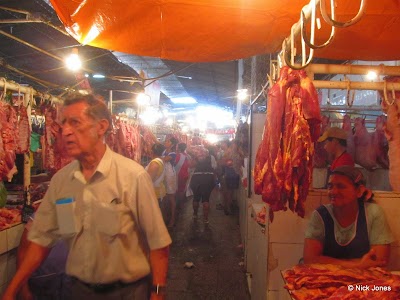
More meat than they can possibly sell....at least today
The market isn't huge, but those streets it does fill are bursting with activity.* There are shops whose wares spill out on to the pavement, on which are stalls, standing alongside wheelbarrows of sliced pineapples, butting up to baskets stacked high with towers of bread, overshadowing cloths laid on the floor with a neat scattering of ancient relics dug up from the rubbish tips, besides juicer trolleys - the women frantically pressing oranges - then tattooists tattooing, barbers shaving faces, women painting nails, all in the street and amongst a mob of desperate shoppers.* The flustered shoppers are aided by porters, porters proudly sponsored – for some reason -by the main fried chicken restaurant chain in the city, called "Batman Chicken" (a chicken in a Batman outfit).** These porters carry or trolley loads of purchases forcefully out of the market to waiting buses or taxis, taxis which are also senseless enough to drive through the market.* All of this makes stalking Mennonites quite difficult and after a week in Santa Cruz I have just three dismal photos of Mennonite limbs and staring gormless Latinos.* I decide that a change of tact is in order…and I have just the plan.
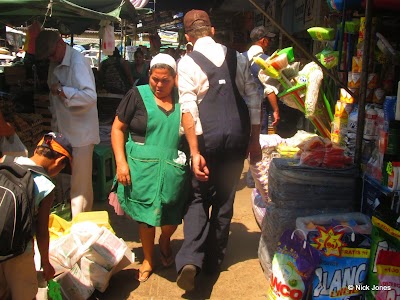
Stalking Mennonite man

Stalking Mennonite Women
After several days humming and hawing about the deeper technical aspects of my new plan, I eventually pluck up some courage and go in search of any Mennonite man with a friendly looking face.* Finding one I introduce myself and tell him directly, and nervously, my plan; that I want to visit his house. "My house?* You want to visit my house?* What for?"
I hadn't anticipated questions, nor were my nerves considered as part of the plan and I realise those days spent planning were not spent wisely.* I bumble on for 10 minutes talking about my trip, my interest in his culture, punctures, the weather, his family's laundry/ironing habits and those impeccable trouser creases.* Luckily I don't mention stalking them in the market for several days nor the fact that more or less all girls think I'm a baby eater.
"But what will we do?" he asks.
"I don't know…talk, look around……eat lunch?"
"You want to come to my house and eat?"
"Well…."
"Ahh, OK," he says enlightened, "so you want to see how we live and what we eat?"
"Yeah, I guess, well, more or less." I say.
"OK," he agrees with a shrug, maybe just so he can escape, and he promptly fires off an address, one which seems impossibly short, "219c".* Not sure if I've heard correctly, I ask him to repeat it, and then ask him – just to make absolutely sure – to write it down.* 2-1-9-c. "Is that it?"* I ask, "But, where is it?* How do you get there?"
"Down route 9 and turn left,"
I try to remember which one is route 9, but can't and unsure I just ask, "How far down route 9?"
"I don't know, are you going by bus?"
"No, motorcycle…"
"Well in the bus it's about half an hour…I don't know about motorcycle," he says, and perhaps finding my questions a bit arduous, "It's easy," he adds, "just ask for Peter Peter."
"Peter Peter?"
Feeling that I've pushed the limit with my questioning I say goodbye and begin wondering if I might have just let my best chance slip by, or that perhaps he was trying to fob me off, I mean who calls themselves,"Peter Peter"?* Surely I'll never find this place.
The next day and long after leaving the hostel I'm not sure I've even moved at all, still trapped as I am in the thick of the city, the narrow corridors of twinned streets.* At long intervals I find myself at a place I recognise, a certain roundabout with a statue, the large glass Samsung building, the uniquely wide boulevard exiting eastwards (I want west), or the street that doubles as a taxi and bus stop - a hectic and maddening road which I'd sworn to avoid. *Motionless and*despondent I think of Peter Peter telling me to turn left after thirty minutes, but already I've been at this for hours.
With some relief I reach the turning south on to Route 9 and feeling like I can finally make some real headway, I stop at a shade tree to eat lunch and paddle about in the usual accompanying litter.* Then, I continue on along the main paved road south until I come to a few huts, one or two shops amongst them.* Glad to be out of the city I sit down for a drink and it's then I notice a turning off the main road here, and actually it's been about half an hour. *Here seems as good a spot as any and I decide to take the turning and slam my bottle down with galvanised resolve.
A broad and rutted laterite road spears its way east into the lattice work of other similar dirt roads and flat fields.* No sign of Mennonites yet, but pausing at a wide open crossroads a Latino man approaches from a repair shop and asks where I'm going. "Twenty, fifty, one-hundred….." he ruminates, ticking off plots along the horizon, "mmmm…..219….219….I think that's real far, over that way," he says pointing north east, "what's his name, who ya goin' to see?"
"Well, he said his name is Peter Peter."
"Peter!* Oh yeah, I know Peter, real nice guy…but ooooh, that's far….!"* I can't believe my luck, perhaps now I've got a chance after all!** The man gives me some incredibly lengthy directions to compete with Maugham and I try my best to remember, quickly thanking and leaving the Latino man the moment he finishes, before I forget.

Mennonite House

Mennonite carriages
Shortly and I feel like I must be getting closer, now in 1940s rural Germany.* It is truly incredible with horse carts kicking up dust on the rutted mud roads, girls in bonnets, in a line walking from church, boys pushing out trolleys carrying silver churns of the afternoon's freshly drawn milk, men on old tractors, outside sheds and welding, or with horse and controlling the reins standing on a flatbed trailer along with his flock of blonde sons.* There are red brick houses, white picket fences and wind powered water pumps; the shiny metal turbines rising up into the air.* There is not a telegraph pole nor electricity pylon in sight.* I forget all about the directions and just ride along slowly and carefree between the white fences, turning left or right at will and staring girls with muddy hemmed dresses and blonde blonde hair.* I knew the colonies were secreted away here somewhere, and finally I've found one.* I want to stop and put up my tent, to sit in its porch and just watch, to photograph it all, to remember, just remember…but instead I continue pushing on, north east and hopefully towards Peter Peter.
It's getting late and seeing a man I stop at his driveway, to try asking about camping.* Two boys I hadn't spotted watch me from the short trees lining the driveway and when I remove my helmet and step from the bike they run off towards the house.* I walk up the driveway, somehow riding up didn't seem right, and the father comes over, a huge burly man whose huge chest acts like a held out hand saying "STOP".* He leans confidently against the gloss black sweep of his horse carriage, and from between the wooden wheels he watches me with an unmoving, calm gaze as I approach.* I shake his hand though he doesn't raise from his lean.* The children, they crowd around, near and far, seven or eight of them, inside, around and on top of the safety and familiarity of the carriage, some leaning on their hands closer, staring, intrigued, barefoot, others hiding behind the father.* Pixies and elves and nymphs every one.* I realise now the difference between Europeans and South Americans, intrigue and interest.* But also they have reason and when I ask about camping the father replies matter-of-factly, "what's in it for me?"* I can only shrug, thinking to myself "not much, actually."* We continue to talk then, about his family (from Canada, umpteen children) and my own travels, what I've been doing and why I've chosen to come here to the colony particularly.* Our conversation, which has become friendly and relaxed, gives me the impression that perhaps he is interested and I am almost expecting him to say, "well, if you still want to camp you can, just stick it over there."* But, instead he explains he has work to do, and I say goodbye.
Miraculously I find Peter Peter's house, quite some distance on, a lovely neat red brick house set off from the road amongst tightly cut grass with a broad view out over flat fields all the way to the horizon.* As luck has it a boy comes out, one of his sons surely, polite and formal, listening very carefully.* He tells me Peter is still in the city, he won't be back until later, 6 or 7pm, it's now 5:30pm.* I ask if I can wait, but he seems unsure and I tell him not to worry, I'll come back tomorrow. Reluctantly I go in search of camp, taking some condolence in the fact that I have at least found the place.
Not only is darkness coming but also a storm, giving me something else to think about as I look for camp. *These roads will be dire in the wet, there amongst the deep narrow ruts carved by the thin wooden wheels of the carts - which would no doubt handle the mud with aplomb. *I also remember one of the men that I spoke with earlier was welding up a set of steel paddle wheels for his tractor, testament to the difficulties and - I fear - in preparation for the storm.* Camp is therefore tricky to find, as I worry about being able to exit in the morning if the rain is bad.* I ride up a field track which is near the main (dirt) road running north back to Santa Cruz from which I could get help from a passing truck if need be.* It's one of the problems with camping often overseen, especially in tropical climates where the rain can really pour down in huge quantities, will you be able to escape camp in the morning? *Will you even wake up in the same place you went to sleep or find you have been washed off! *And if not one of these delectable scenarios will you otherwise find the rivers to be flooded leaving you stranded in no-man's lands in-between towns?

Having found a Peterless house, I had to camp....
|

31 Jan 2015
|
|
Registered Users
HUBB regular
|
|
Join Date: Aug 2008
Location: on the road
Posts: 99
|
|
|
Mennonites - Pt 3 of 3
That night the rain is bad but not horrific, a warning of things to come as the rainy season gathers pace.* I backtrack to Peter-Peter's house next morning and with great relief I see him come out of his garage as I peer up his driveway and he waves me to ride up.* Parking the bike, Peter passes by his horse and carriage to shake hands.* He looks happy with the smile of an old friend and I hope he likewise.* Back in the garage and he's using a soldering iron to plug a cracked radiator from his generator, a generator used to power his tools – he's a carpenter making horse carriages.* Whilst the Mennonites frown upon electronics and cars they will use tractors for work, buses to get to the city and electrical tools and petrol engines around the farm.* A neighbour arrives, Jacob Enns, he likewise wears pristine navy blue overalls and trucker cap, making me feel doubly dirty after a damp night and a muddy ride.* "Why did you camp in the fields?" says Peter, "You could have stayed here!" making me wish I'd hung around in the dark and returned later last night, what a missed opportunity, I could spend weeks here.
Across from us I can hear children singing from a small hut, the school and for a moment my thoughts are lost as Peter and Jacob talk amongst themselves in German.* The main study material in Mennonite schools is the bible, written in Gothic script, singing is formally taught as is reading, writing, arithmetic (measuring land, time), and spelling.* They write on slate.* Girls usually receive six years of formal education and boys seven years.* I'm mesmerised then as I see the boys leaving the classroom, a dozen filing out, one blonde clone after another, flicking their navy blue caps onto their heads exactly as the one before them and then running off, stride for stride.* The boys are followed by the dozen girls who walk out as prim and proper as only girls should!* If any of Britain's children had to attend such a school I can only imagine that it wouldn't be long before they were tossed into the well, or else severely beaten with the King James.
"Are you hungry?" asks Peter.
"Always."
"OK, come on.* Let's go inside…" he says with a smile.
Inside and everywhere is so clean, I worry about dirtying everything, and say as much.* Whilst clean the rooms appear quite bare and despite colourful curtains and decorative cupboards, conversations reverberate off the white walls cold and hard.* Peter and Jacob remove their caps and place them on the hat rack hanging from the ceiling, from which dangle the black ribbons of the women's own straw hats.* Peter has a small family by Mennonite standards, just three children, though apart from his eldest daughter who helps her mother cook, the others won't eat until later.* Peter's wife has uncommon auburn hair, though she is still as stocky as the next Mennonite woman, and more Russian Babushka than Swiss dame.* She and her daughter rush around frantically preparing food as if for a Victorian banquet, though soon enough we all sit down.* Peter and Jacob bow their heads in silent prayer and no sooner; begin to consume food at a frantic pace.* With this particular colony (there are 25 colonies in Bolivia) originating from Mexico, the food is likewise; I see fried tortillas, frijoles (beans), cheese and fruit though only for a few moments until very quickly it is gone. *Satisfied, Peter and Jacob bow their heads in another quick and silent prayer as if picking up the signal from a UFO and the meal is finished.
I take some photos, wishing I'd asked earlier, as Peter encourages me to do whatever I like, the wife giggles shyly and disappears, the daughter on the other hand is keen to have her photo taken - at the behest of Peter - though she is likewise shy, and I notice - as is common - she looks downs meekly away from the camera as if to be punished when *the camera is pointed.* I comment on Peter's laundry machine as we walk out; a lawnmower engine and two stainless steel tubs, made proudly by himself and then back outside - Peter thinking that time is up - says he's got work to do, and whilst I wonder about asking to tag along I don't want to push my luck, for I am immensely lucky to have met him.* I thank him greatly, before heading off.

Cattle feeder
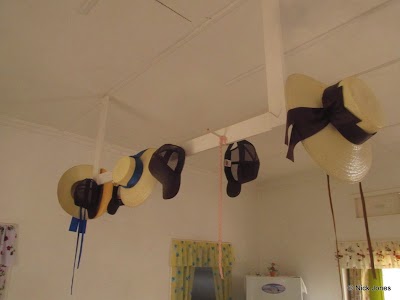
Hat rack in Peter's house

Dinner time!
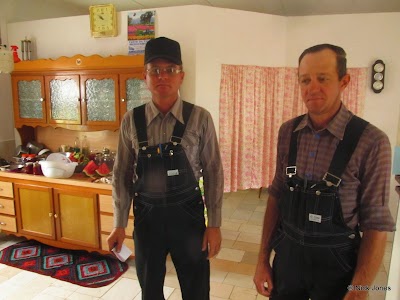
Jacob Ens, left and Peter Peter. Top chaps, and really kind to let me visit.
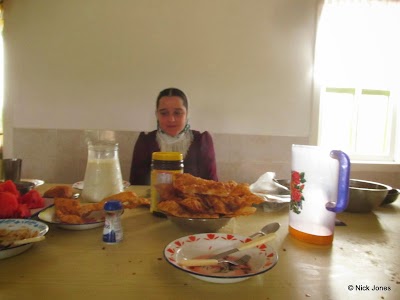
The shy daughter of Peter, was still excited to see this picture, even if it was a bit blurry
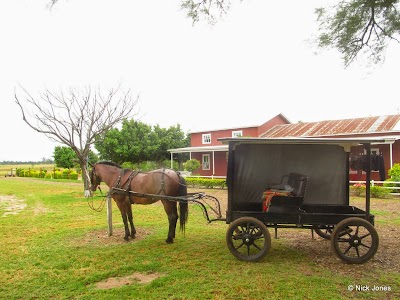
Peter made horse carriages, this his very own, outside his house
With my visa running out I begin heading back to the west, back up to the altiplano and towards northern Chile.* It means backtracking on roads taken earlier and as I approach the green mountains near Samaipata it feels like coming home, the air is sweeter and the mountains stand besides me like old friends should, and no more mosquitoes! *I decide to stop off along the way at a place called "El nido de los condores", "The Condors Nest".* Whilst I'd nearly tripped over a condor in Peru, I hadn't got a good view and don't want to pass up what could be my last opportunity.
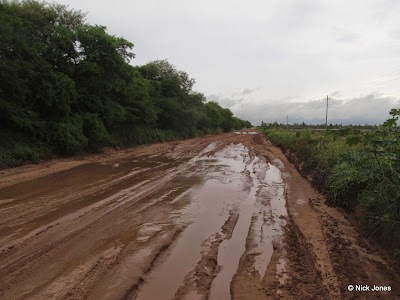
It rained in the night, and made the road a bit slippery

I had quite wet feet!
The trail-head is at the very end of a narrow dirt road running into the very bottom of a hot valley.** At first I struggle to find the footpath, not realising that the road continues a little farther beyond two small river crossings, ending at a small farm house.* Two mad ladies tell me this is the correct place, I need to sign my name and pay 90p, I'm the only visitor today.
Having had some bad experiences with hiking trails in the past I ask the two ladies a few questions; is the trail*straightforward, is the path obvious, clearly marked, are there any junctions, is the path overgrown,to what altitude does it go, how long will it take, how long will it take and finally; how long will it take? *Of course the crazy ladies have a good old joke about this, telling me there are tigers all over the place, that I will surely die, get lost and that they will inherit a slow bike, a rusty tool kit and a mouldy tent.* I give as good as I get, all in good fun, though exact details are lost from my memory and I'm pretty sure they call me a "cheeky bugger" despite me not knowing the Spanish equivalent.* They tell me the hike is six hours (I'd read it was 8) then she says I will get there at 1pm (it's already 10:30am), so I ask if it's six hours there and back, no it's six hours, so how will I arrive by 1pm?* She looks up into her mind, thinking, and changes the ETA*to 2pm, then 3pm then, laughing manically, "maybe by 4pm."* Finally she goes into the back room and comes back to hand me a machete and also offers me a torch, her friend giggling away like a little school girl sidekick.* I grab some hunks of bread and water and tell them to make me a coffee for when I get back (I would have said "smoke me a kipper" Red Dwarf fans).
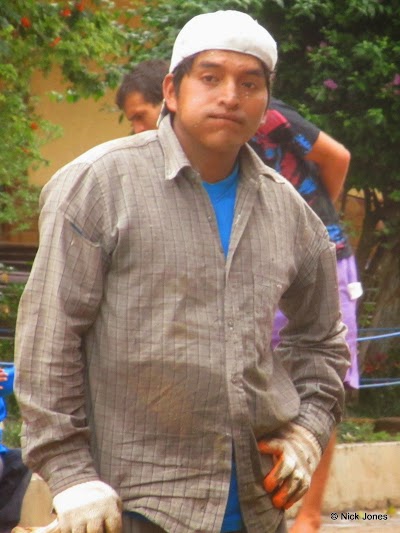
Labourer chewing a huge wad of coca
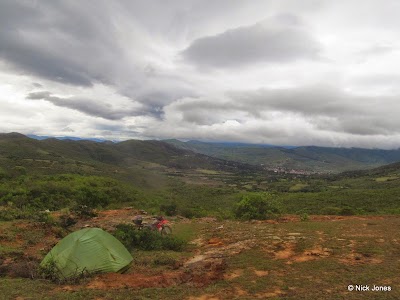
I reached Samaipata and returned to my previous camp spot on my way to see the Condors
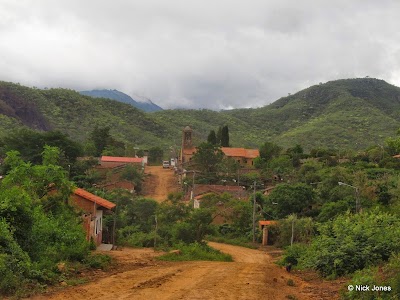
The road to the Condors Nest was good!
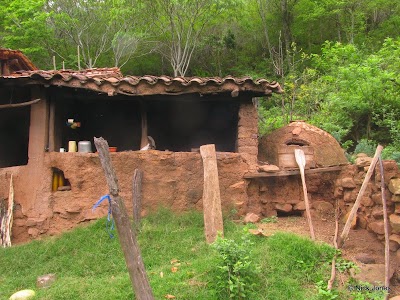
A bread oven outside a house

Maize masher
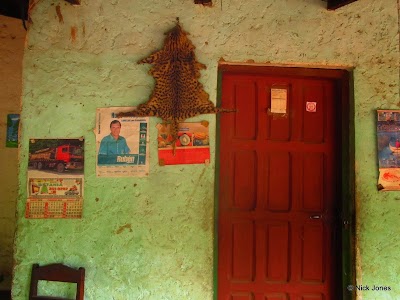
Nice animal skin
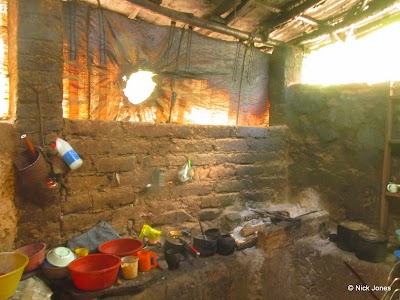
Kitchen
Beginning the trail* I realise that the path is blatantly obvious and there is no possibility of getting lost, I could walk up with my helmet on backwards and there is certainly no need for the machete which I lean against a tree to collect on the way back.
I have this thing about trying to complete hikes in half the guide time.* I don't know why, it's not to prove a point, I just like pounding uphill and it actually takes me less than two hours to arrive at the summit, which in contrast to the scorching valley is cool and nestled in thick damp fog.

Reaching the top I found it nestled in fog, no chance of seeing Condors, I was extremely disappointed
The fog makes for impossible condor viewing and I sit despondently, ruing my bad luck and eat lunch.** It tastes bland and dry.* However, I'm not really sure I'm in the right spot, is this the top, or is there a higher peak up there, maybe out of the mist?** There's certainly no signposts, so I go in search, visiting the neighbouring peaks all the time knowing it is pointless as the condors won't fly in cloud.* I walk miles.* When I finally return to my lunch spot, I decide I can wait until a latest of 4pm, at which point I must descend before darkness to look for camp, though the cloud shows no signs of clearing, thick and unbroken.
At 4:10pm the cloud, within seconds, miraculously clears.* Almost instantly I spot something far, far, far off, circling below, perhaps a mile or even two away, just a circling black dot.* I watch it for a while, sweeping around, losing the small dark shape occasionally amongst the shades of rock until all of a sudden it catches a thermals, rises effortlessly and incredibly quickly and more miraculous yet, turns towards me!* As if it had spotted me all that way away it comes over, all the while getting bigger and bigger and BIGGER, until finally right above me, staring down with a beady eye and with intrigue and its gigantic 3m wing span.* I watch it land heavily on the rocky outcrop to my right, curling up its wings somehow on its body. *I try sneaking towards it until I see it unsheathe its wings and jump off to*float in circles below. *I see the long white stripe across its wings, then it catches a thermal shoots up and disappears back into the distance.
[url=http://lh5.ggpht.com/-qGeIAaxUeTg/U_uozzkSwGI/AAAAAAAADpA/9lbdNGfiZyQ/s0/IMG_6855.JPG] 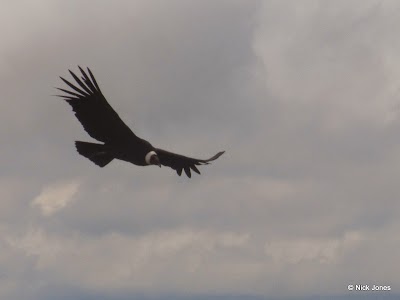
I stuck around until after 4pm and miraculously the cloud cleared, and out came Clive the Condor
[url=http://lh3.ggpht.com/-MxA9jn-NTsk/U_uo3B3faiI/AAAAAAAADpQ/_A0NrxB5j70/s0/IMG_6891.JPG] 
I found this nice little patch to camp at on my way to Valle Grande [Camp 536]
With my visa running out I have to get a move on and began heading back towards the west of Bolivia and Uyuni to cross into Chile via the altiplano.....though I'd happily stay forever.
|

17 Mar 2015
|
|
Registered Users
HUBB regular
|
|
Join Date: Aug 2008
Location: on the road
Posts: 99
|
|
|
New photos posted

New photos up from southern Argentina and Chile (Chalten, Fitzroy, Perrito Moreno, Torres del Paine, Ushaia, penguins)
You can view them on:
The website or facebook or flickr!
|
|
Currently Active Users Viewing This Thread: 2 (0 Registered Users and/or Members and 2 guests)
|
|
|
 Posting Rules
Posting Rules
|
You may not post new threads
You may not post replies
You may not post attachments
You may not edit your posts
HTML code is Off
|
|
|
|

Check the RAW segments; Grant, your HU host is on every month!
Episodes below to listen to while you, err, pretend to do something or other...

2020 Edition of Chris Scott's Adventure Motorcycling Handbook.
"Ultimate global guide for red-blooded bikers planning overseas exploration. Covers choice & preparation of best bike, shipping overseas, baggage design, riding techniques, travel health, visas, documentation, safety and useful addresses." Recommended. (Grant)

Led by special operations veterans, Stanford Medicine affiliated physicians, paramedics and other travel experts, Ripcord is perfect for adventure seekers, climbers, skiers, sports enthusiasts, hunters, international travelers, humanitarian efforts, expeditions and more.
Ripcord Rescue Travel Insurance™ combines into a single integrated program the best evacuation and rescue with the premier travel insurance coverages designed for adventurers and travel is covered on motorcycles of all sizes.
(ONLY US RESIDENTS and currently has a limit of 60 days.)
Ripcord Evacuation Insurance is available for ALL nationalities.
What others say about HU...
"This site is the BIBLE for international bike travelers." Greg, Australia
"Thank you! The web site, The travels, The insight, The inspiration, Everything, just thanks." Colin, UK
"My friend and I are planning a trip from Singapore to England... We found (the HU) site invaluable as an aid to planning and have based a lot of our purchases (bikes, riding gear, etc.) on what we have learned from this site." Phil, Australia
"I for one always had an adventurous spirit, but you and Susan lit the fire for my trip and I'll be forever grateful for what you two do to inspire others to just do it." Brent, USA
"Your website is a mecca of valuable information and the (video) series is informative, entertaining, and inspiring!" Jennifer, Canada
"Your worldwide organisation and events are the Go To places to for all serious touring and aspiring touring bikers." Trevor, South Africa
"This is the answer to all my questions." Haydn, Australia
"Keep going the excellent work you are doing for Horizons Unlimited - I love it!" Thomas, Germany
Lots more comments here!

Every book a diary
Every chapter a day
Every day a journey
Refreshingly honest and compelling tales: the hights and lows of a life on the road. Solo, unsupported, budget journeys of discovery.
Authentic, engaging and evocative travel memoirs, overland, around the world and through life.
All 8 books available from the author or as eBooks and audio books
Back Road Map Books and Backroad GPS Maps for all of Canada - a must have!
New to Horizons Unlimited?
New to motorcycle travelling? New to the HU site? Confused? Too many options? It's really very simple - just 4 easy steps!
Horizons Unlimited was founded in 1997 by Grant and Susan Johnson following their journey around the world on a BMW R80G/S.
 Read more about Grant & Susan's story
Read more about Grant & Susan's story
Membership - help keep us going!
Horizons Unlimited is not a big multi-national company, just two people who love motorcycle travel and have grown what started as a hobby in 1997 into a full time job (usually 8-10 hours per day and 7 days a week) and a labour of love. To keep it going and a roof over our heads, we run events all over the world with the help of volunteers; we sell inspirational and informative DVDs; we have a few selected advertisers; and we make a small amount from memberships.
You don't have to be a Member to come to an HU meeting, access the website, or ask questions on the HUBB. What you get for your membership contribution is our sincere gratitude, good karma and knowing that you're helping to keep the motorcycle travel dream alive. Contributing Members and Gold Members do get additional features on the HUBB. Here's a list of all the Member benefits on the HUBB.
|
|
|















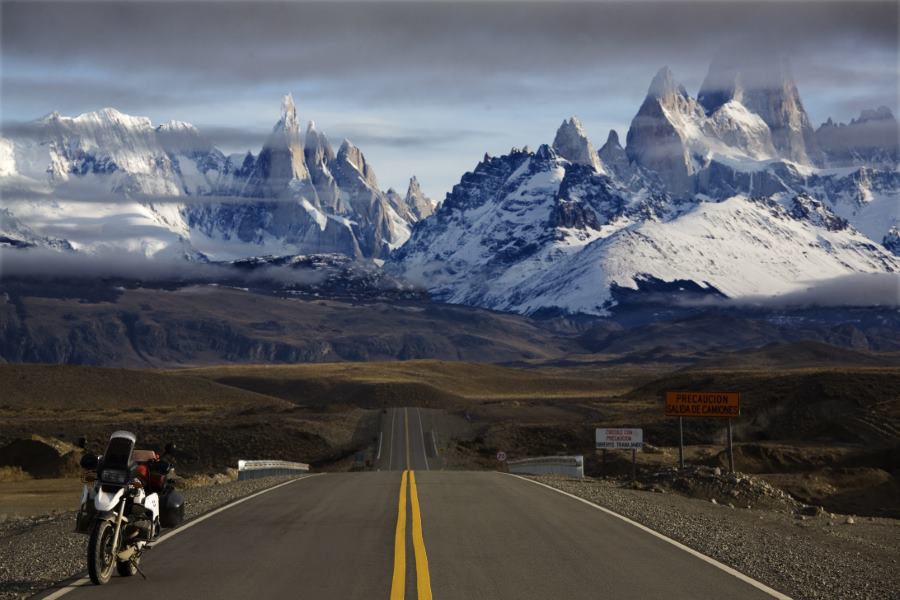
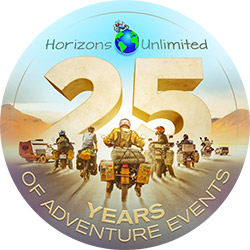
 6Likes
6Likes

 and cigarettes to the inebriated men.* So strange, to allow so many days of so much sin for the whole of Holy Week.** Thanks be to God.* And to Jesus who died for our sins.* Would it not be better if we died for our own?
and cigarettes to the inebriated men.* So strange, to allow so many days of so much sin for the whole of Holy Week.** Thanks be to God.* And to Jesus who died for our sins.* Would it not be better if we died for our own?

















































































 Linear Mode
Linear Mode










